Ph.D. in Public Health Salary – 2024

Life expectancy in the U.S. has increased dramatically over the past two centuries. While many people mistakenly attribute this increase to medical science, public health is behind the advances in cleaner water, better sanitary conditions, better nutrition, and the control of infectious diseases that have prolonged human life expectancy. Since the beginning of the COVID-19 pandemic, the demand for Ph.D.-educated public health professionals has increased significantly. The average Ph.D. in public health salary in the U.S. is $110,300 although there is a great deal of variation both regionally and by public health specialty. With average compensation that tops $150,000 annually, Washington State pays the highest Ph.D. in public health salary; in Mississippi, however, Ph.D.-educated public health officials can anticipate earning barely one-third of that figure ($53,960.) Biostatisticians, epidemiologists, and health policy analysts are the three public health specialties that earn the highest salaries. How much do Ph.D. in public health graduates make? This article provides an in-depth look at the salary for Ph.D. in public health graduates in 2024.

Is There A High Demand For Ph.D. in Public Health Graduates?
What career opportunities exist for ph.d. in public health graduates, epidemiology:, community health:, health education:, public policy:, environmental health:, hourly salary for ph.d. in public health graduates, starting salary for ph.d. in public health graduates, average salary for ph.d. in public health graduates, salary for ph.d. in public health graduates by level of experience, average annual compensation for ph.d. in public health graduates, how does ph.d. in public health salary compare to other public health degrees, what is the average ph.d. in public health salary by state, 1. alabama:, 3. arizona:, 4. arkansas:, 5. california:, 6. colorado:, 7. connecticut:, 8. delaware:, 9. florida:, 10. georgia:, 11. hawaii:, 13. illinois:, 14. indiana:, 16. kansas:, 17. kentucky:, 18. louisiana:, 20. maryland:, 21. massachusetts:, 22. michigan:, 23. minnesota:, 24. mississippi:, 25. missouri:, 26. montana:, 27. nebraska:, 28. nevada:, 29. new hampshire:, 30. new jersey:, 31. new mexico:, 32. new york:, 33. north carolina:, 34. north dakota:, 36. oklahoma:, 37. oregon:, 38. pennsylvania:, 39. rhode island:, 40. south carolina:, 41. south dakota:, 42. tennessee:, 45. vermont:, 46. virginia:, 47. washington:, 48. west virginia:, 49. wisconsin:, 50. wyoming:, what are the 10 highest and lowest paying states for ph.d. in public health graduates, average ph.d. in public health salary by city for 2024, what is salary outlook for ph.d. in public health graduates, 3 ways to boost your ph.d. in public health salary, • teaching:, • consulting:, • relocating:, summing it up.
We have used the following sources to compile the salary data on this page.


DHSc vs. Ph.D.: What Path Should You Take?
Earning a Doctor of Health Science (DHSc) or a Ph.D. in Health Science can lead to jobs at the pinnacle of the healthcare profession. When choosing between a DHSc vs. Ph.D., it’s important to understand that the degrees target people with different career ambitions.
Typically, a Ph.D. focuses on original research and a dissertation. A DHSc provides current health professionals the skills they need to become innovative leaders in healthcare administration, education, and research positions.
Graduates from Touro University Worldwide’s online DHSc program apply theory to solving complex challenges in leadership roles. Earning the degree opens the door to a wide range of jobs, including hospital administrators, research team leaders, health information managers, and health education specialists.
Comparing a DHSc vs. a Ph.D.
Both doctoral degrees can fulfill the ambitions of professionals motivated to work in the upper echelons of healthcare. However, there are key differences between the two. Deciding which degree to pursue depends on your career aspirations.
Similarities: DHSc vs. Ph.D.
Both degrees build on job experience and knowledge gained at the master’s level. Health science is a multidisciplinary field. Graduates from either program go on to research life-saving medicines, develop tech-driven medical devices, or improve the management of clinics and hospitals.
Health science is so vast that doctoral graduates can approach their jobs from different perspectives , including STEM, social care, mental health, physical health, and medicine.
Differences: DHSc vs. Ph.D.
A Ph.D. is a traditional academic and research-focused degree that often focuses on a specific area of healthcare research. A Ph.D requires a dissertation to graduate.
A DHSc is an applied doctorate, just like a Doctor of Physician Assistant. Students learn the skills and tools needed to develop evidence-based solutions in health science in various settings. Under the guidance and mentorship of a faculty member, students also create a research project that applies to their area of interest.
Career Options: DHSc vs. Ph.D.
A Ph.D. program graduate may pursue research and teaching jobs in an academic setting or private company. They lead research in their area of expertise and provide education for the next generation of health scientists.
DHSc graduates enjoy a wide variety of options. Students in the program are often graduates from health science degree programs . Others come from fields across healthcare, including nursing, physical therapy, occupational therapy, and mental health. They may focus on population health, hospital operations, or guiding community clinics.
Three examples of Doctor of Health Science salaries and careers include the following (all salary and job projection numbers from the U.S. Department of Labor Statistics ):
Medical and health services managers . These administrators plan and direct healthcare operations. The median salary reached $104,280 in May 2020. Projections call for a 32% in jobs between 2019 and 2029.
Medical scientists . They conduct research to find ways of improving human health. The median salary reached $91,510 in May 2020. Projections call for a 6% increase in jobs between 2019 and 2029.
Health education specialists . They develop health education programs that support individuals, families, and communities to improve their health. The average salary reached $62,120 in May 2020. Projections call for a 13% increase in jobs between 2019 and 2029.
TUW’s Doctor of Health Science Degree
Students in the 48-credit TUW DHSc program begin with core courses that cover a range of healthcare topics.
- History of Health Promotion and Disease Prevention
- Theoretical Foundations in Health Science
- Ethics and Professional Leadership in Health Science
- Health Informatics
- Program Development and Evaluation for Health Professionals
- Epidemiology
- U.S. and Global Health Policy
- Introduction to Biostatistics
- Occupation and Environmental Health
- Quantitative Research and Analysis
- Qualitative Research and Analysis
- Survey Design for Health Science
Students then work with the program chair and committee to develop a doctoral research proposal. Once approved, students then complete the doctoral research project, culminating with a successful oral defense of their project before the committee.
The TUW program offers several unique features. All instructors are health science experts actively working with private companies, government agencies, and not-for-profit organizations. TUW offers the program 100% online, giving students the flexibility needed to earn their degrees while maintaining professional and personal schedules. All course content is designed to allow students to complete the process at their own pace.
Similar Posts

Lessons of the Pandemic: Public Health in the 21st Century
The lessons of the pandemic reveal vulnerabilities in public health, how to improve healthcare, and define the profession in a new century.

Bachelor of Health Sciences (BSHS) Degree Track Options at TUW
Students have three BSHS degree track options at TUW, including healthcare administration, health education, and long term care administration.

What are the Fastest Growing Jobs in Healthcare?
What are the fastest-growing jobs in healthcare? Many are in health care administration. Earn an online bachelor’s degree from Touro University Worldwide.

Would You Survive a Zombie Apocalypse? Take the Quiz!
Would you survive a zombie apocalypse? With this quiz, we’ll give you the chance to test…

What Is Health Psychology?
Health psychology is a subset of mental health connecting individual behavior and sociology with human health. Study this important field online at TUW.

DBA vs DMGT: What’s the Difference?
DBA vs DMGT? Whether you earn a Doctor in Business Administration or Doctor of Management, both prepare for top leadership jobs. Study online at TUW.

How to Use Military Tuition Assistance
©2024 Touro University Worldwide. All rights reserved.
- Touro System
- (877) 868-7690
Quick Links
- About Touro University Worldwide
- Message from the CEO
- Mission, History & Accreditation
- Career Outcomes
- Program Resources
- TUW Colloquium
- Mental Health and Crisis Resources
- HEERF Reports
- Institutional Goals & Outcomes
- Annual Consumer Information Disclosure
- Faculty and Staff
- Employment Opportunities
- TUW-TCLA Annual Security Report
- Biennial Report
- School News
- Touro University Worldwide Locations
- Bachelor of Science in Business Administration
- Master of Arts in Dispute Resolution
- Master of Arts in Industrial & Organizational Psychology
- Master of Arts in Public Administration
- Master in Business Administration
- Master of Science in Human Resource Management
- Master of Science in Business Analytics
- Doctorate of Business Administration
- Doctor of Management
- Master of Arts in Marriage and Family Therapy
- Master of Arts in Counseling: Addiction
- Doctorate of Marriage and Family Therapy (DMFT)
- Bachelor of Arts in Psychology
- Master of Arts in Psychology
- Master of Science in Forensic Psychology
- PsyD in Human and Organizational Psychology
- Bachelor of Arts in Social Work
- Bachelor of Science in Health Sciences
- Master of Science in Health Sciences
- Master of Science in Human Services
- Master of Science in Healthcare Administration
- Doctorate of Physician Assistant
- Doctor of Health Science
- Associate of Arts in General Studies: Accounting Concentration
- Bachelor’s Degrees
- Master’s Degrees
- Doctorate Degree
- Financial Aid Information
- Scholarships
- Associate Degree
- Bachelor’s Degree
- Master’s Degree
- International Student
- High School Seniors
- Traditional Credits
- Non-Traditional Credits
- Amarillo College Transfer Partnership
- Collin College Transfer Partnership
- Del Mar College Transfer Partnership
- Lone Star College Transfer Partnership
- Maricopa Community Colleges Transfer Partnership
- Rio Salado Teacher Education Partnership
- Alvin Community College
- Technology Requirements for Online Courses
- Admissions FAQ
- Academic Calendar
- Academic Policy FAQ
- Commencement
- Registrars Office
- Educational Advisement
- Student Orientation
- Disability Services
- Career Resources
- University Student Voice System
- Merchandise
- Student Catalog
- Information Literacy
- University Librarian
- Letter from the CEO
- Military Education Benefits
- Military Friendly Online Degree Programs
- Military Admissions Requirements
- College Credit for Military Training & Service
- Military Resources and Contacts
- Military Tuition Discount Rates
- Military Spouse and Family Education Benefits
- Military Affiliations
- Online Degrees
- Tuition & Financial Aid
- Transferring Credit
- The Franklin Experience
Request Information
We're sorry.
There was an unexpected error with the form (your web browser was unable to retrieve some required data from our servers). This kind of error may occur if you have temporarily lost your internet connection. If you're able to verify that your internet connection is stable and the error persists, the Franklin University Help Desk is available to assist you at [email protected] , 614.947.6682 (local), or 1.866.435.7006 (toll free).
Just a moment while we process your submission.
Popular Posts

Doctorate in Healthcare Administration Salary: 8 Top-Paying Jobs
The U.S. healthcare system is large and complex, made even more complicated by pandemic-related challenges and aging Baby Boomers. From patient safety to risk management and service quality, there is ample room for innovation and improvement, and the people prepared to lead the charge have terminal degrees in healthcare, particularly doctorates in healthcare administration (DHA).
Without question, the nation’s healthcare systems need fresh yet practical solutions to help solve real-world healthcare dilemmas, gaps and problems. Leaders with a DHA can amplify their careers, both in responsibility and lifetime earning potential. For example, a DHA qualifies professionals for C-Suite positions, which according to the Bureau of Labor Statistics, the average annual salary for chief executives was $197,840 as of May 2020, with the potential to earn much more.
The Current Demand for Professionals with a DHA
Job outlooks in healthcare administration are on the rise, with the BLS projecting the industry to increase 18% from 2016-2026. The growth is due to a variety of factors, including the COVID pandemic.
“COVID shook up leadership in healthcare,” said Dr. Gail Frankle, DHA program chair at Franklin University. “The old-style leaders retired while people who were able to pivot were innovative and called on their teams to step up to the plate and weather the storm. Now those innovative leaders can see their own potential and are earning doctorate degrees.”
And that’s a good thing, considering healthcare administration is on the rise and earning a terminal degree prepares leaders to make logical, relevant connections between classroom learning and real-world efficiencies and effectiveness.
Advance your career in Healthcare Administration while you advance patient care. Download your free career guide.
Income potential for professionals with a dha.
Financial compensation for healthcare professionals with a DHA can be substantial, with PayScale.com reporting the salary for the top-paid 10% of CEOs at $308,000 in 2021. Without question, earning a DHA can present sizable income opportunities compared to professionals with a bachelor’s or master’s degree alone.
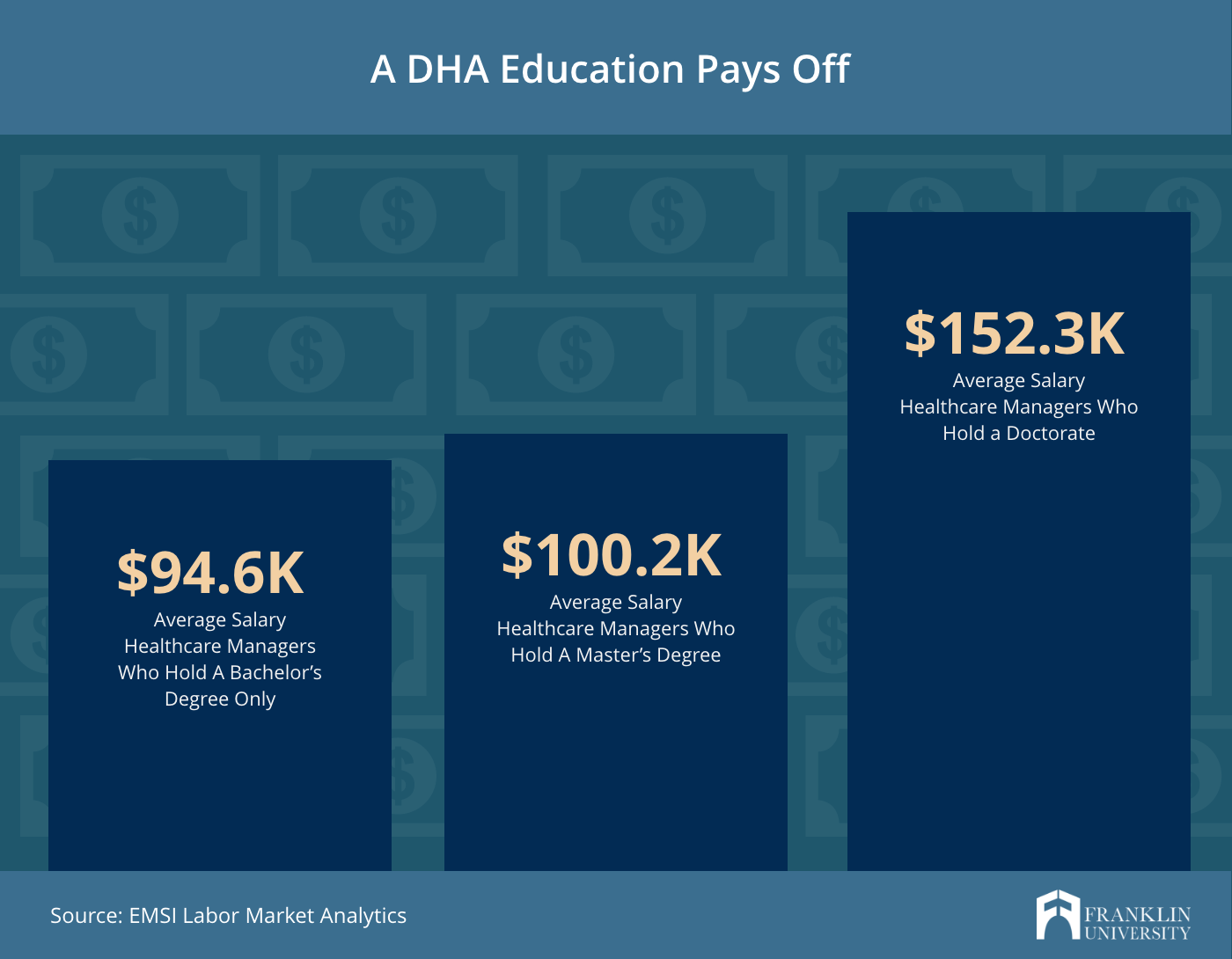
But while earning a DHA can present lucrative opportunities, the program isn’t a fit for everyone.
“You’re not a good fit for a doctor of healthcare administration program if you’ve never worked in healthcare. You need to come with some background,” said Frankle. “Earning a DHA is not a way to break into the industry. When I talk to a student, I want to know what they want to do for a career and what they’re willing to sacrifice. The program is not for everybody.”
The Best-Paying Jobs for DHAs
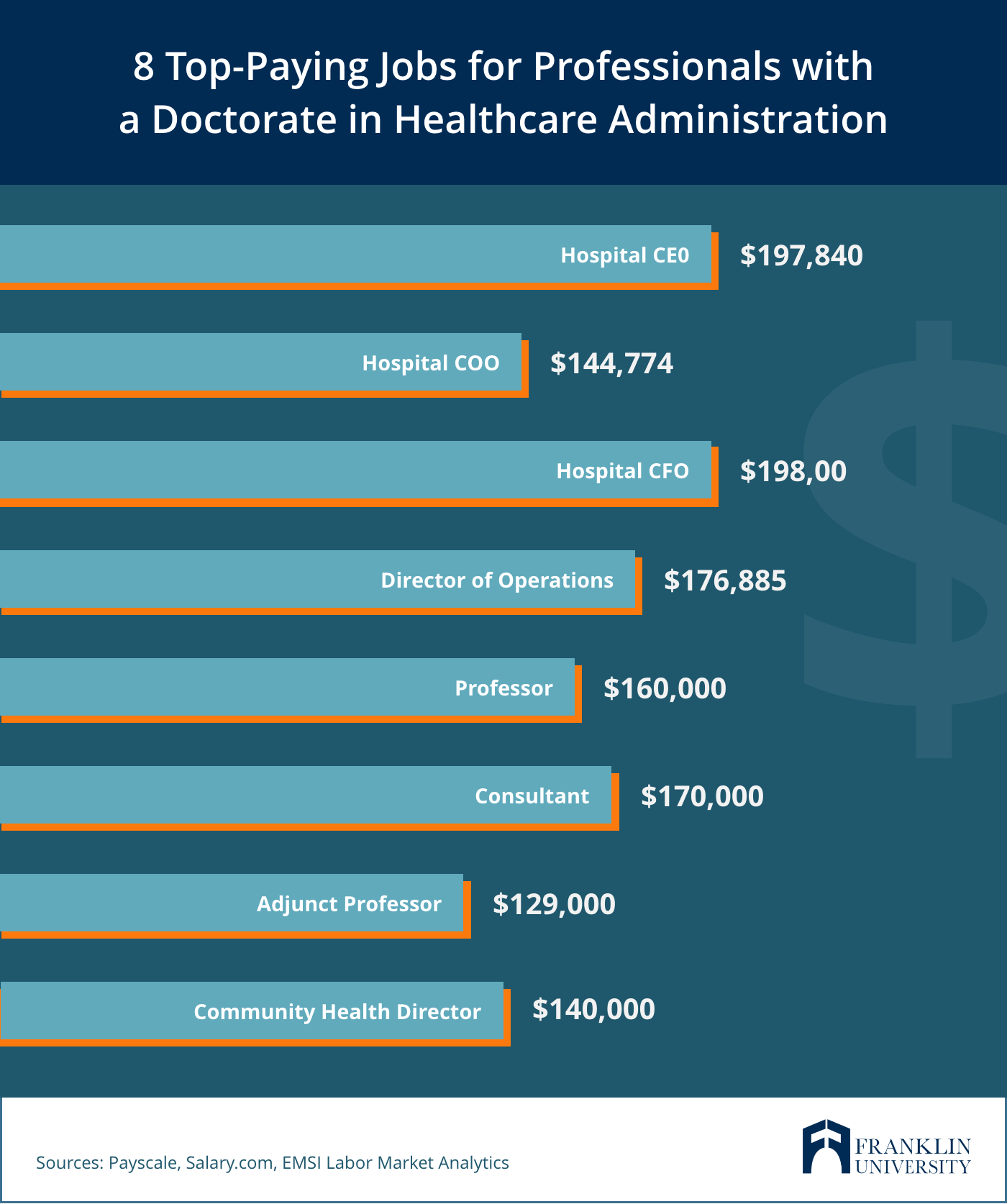
What are the best-paying jobs a professional can get with a DHA? Fortunately, there are many. Let’s look at some of the top professions for DHA graduates and how much they can expect to make on a yearly basis.
Hospital CEO | Average Salary (Bureau of Labor and Statistics): $197,840
Hospital CEOs are responsible for everything that goes on within a hospital and are very management-oriented. CEOs meet frequently with other hospital executives and boards of directors to ensure things go as planned and on budget.
Hospital CFO | Average Salary (Payscale): $198,000
Hospital CFOs carry the primary responsibility for the quality of their institutions' financial reports, ensuring accuracy in financial statements and working with budgets to oversee how money is being spent.
Hospital COO | Average Salary (Payscale): $144,774
As a liaison among executive personnel members of each hospital department, Hospital COOs ensure that one department's activities do not interfere with another and confirm adherence to stated missions and guidelines.
Director of Operations | Average Salary ( Salary.com ): $176,885
A director of operations plans, directs, coordinates, and manages people and policies of a medical operation, which may include formulating policies, monitoring budgets, overseeing programs and assessing patient satisfaction.
Professor | Top 10% of Earners ( EMSI ): $160,000
Professors share research-supported information with students in a variety of academic, medical or business settings with the goal to inform or instruct people in the healthcare field.
Consultant | Average Salary Plus Commission ( P ayscale ): $170,000
Consultant positions can vary greatly, but they typically act as an analyst, learning about a healthcare-related oranization’s operations to improve efficiencies by identifying problem areas and proposing solutions.
Adjunct Faculty | Top Earners ( Payscale ): $129,000
Public health is a rapidly growing field and colleges are seeking DHAs to become tenured professors of public health, healthcare administration and public policy.
Community Health Director | Average Salary ( Salary.com ): $140,000
A community health director may not make as much as other professions in the field; however, the role presents opportunities to make a difference and serve a community, providing a clear track to build a career in Washington, D.C., or as a manager of a federal team.
Earning a DHA Will Help You Land The Job and Salary You Want
While a professional’s salary is always determined by a combination of factors, earning a DHA clearly gives job candidates increased earning potential across their lifetime and access to a wider range of positions. A great place to start is Franklin University because the program is very student-focused, providing exemplary support so students achieve their goals.
“The student is always our focus at Franklin. Everyone who comes into this program is given a variety of advisors who stay with them throughout their coursework and our instructors are phenomenal,” said Frankle. “We want our students to graduate and have successful careers.”
Franklin University’s program is 100% online and features a relevant curriculum plus a variety of electives that allows students to customize their program. Some students even complete their degree in three years, including dissertation.
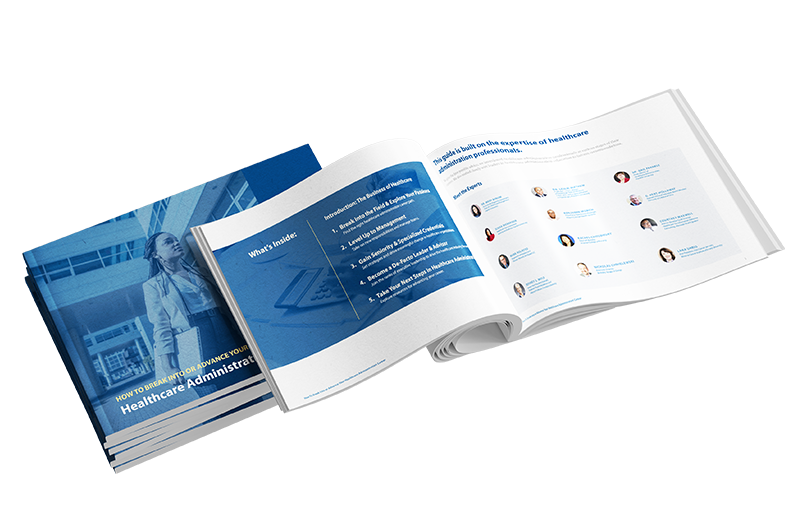
Related Articles

Franklin University 201 S Grant Ave. Columbus , OH 43215
Local: (614) 797-4700 Toll Free: (877) 341-6300 [email protected]
Copyright 2024 Franklin University
Jump to navigation
Search form

The Graduate School
- Faculty/Staff Resources
- Programs of Study Browse the list of MSU Colleges, Departments, and Programs
- Graduate Degree List Graduate degrees offered by Michigan State University
- Research Integrity Guidelines that recognize the rights and responsibilities of researchers
- Online Programs Find all relevant pre-application information for all of MSU’s online and hybrid degree and certificate programs
- Graduate Specializations A subdivision of a major for specialized study which is indicated after the major on official transcripts
- Graduate Certificates Non-degree-granting programs to expand student knowledge and understanding about a key topic
- Interdisciplinary Graduate Study Curricular and co-curricular opportunities for advanced study that crosses disciplinary boundaries
- Theses and Dissertations Doctoral and Plan A document submission process
- Policies and Procedures important documents relating to graduate students, mentoring, research, and teaching
- Academic Programs Catalog Listing of academic programs, policies and related information
- Traveling Scholar Doctoral students pursue studies at other BTAA institutions
- Apply Now Graduate Departments review applicants based on their criteria and recommends admission to the Office of Admissions
- International Applicants Application information specific to international students
- PhD Public Data Ph.D. Program Admissions, Enrollments, Completions, Time to Degree, and Placement Data
- Costs of Graduate School Tools to estimate costs involved with graduate education
- Recruitment Awards Opportunities for departments to utilize recruitment funding
- Readmission When enrollment is interrupted for three or more consecutive terms
- Assistantships More than 3,000 assistantships are available to qualified graduate students
- Fellowships Financial support to pursue graduate studies
- Research Support Find funding for your research
- Travel Funding Find funding to travel and present your research
- External Funding Find funding outside of MSU sources
- Workshops/Events Find opportunities provided by The Graduate School and others
- Research Opportunities and programs for Research at MSU
- Career Development Programs to help you get the career you want
- Teaching Development Resources, workshops, and development opportunities to advance your preparation in teaching
- Cohort Fellowship Programs Spartans are stronger together!
- The Edward A. Bouchet Graduate Honor Society (BGHS) A national network society for students who have traditionally been underrepresented
- Summer Research Opportunities Program (SROP) A gateway to graduate education at Big Ten Academic Alliance universities
- Alliances for Graduate Education and the Professoriate (AGEP) A community that supports retention, and graduation of underrepresented doctoral students
- Recruitment and Outreach Ongoing outreach activities by The Graduate School
- Diversity, Equity, and Inclusion Funding Funding resources to recruit diverse students
- Graduate Student Organizations MSU has over 900 registered student organizations
- Grad School Office of Well-Being Collaborates with graduate students in their pursuit of their advanced degree and a well-balanced life
- Housing and Living in MI MSU has an on and off-campus housing site to help find the perfect place to stay
- Mental Health Support MSU has several offices and systems to provide students with the mental health support that they need
- Spouse and Family Resources MSU recognizes that students with families have responsibilities that present challenges unique to this population
- Health Insurance Health insurance info for graduate student assistants and students in general at MSU
- Safety and Security MSU is committed to cultivating a safe and inclusive campus community characterized by a culture of safety and respect
- Why Mentoring Matters To Promote Inclusive Excellence in Graduate Education at MSU
- Guidelines Guidelines and tools intended to foster faculty-graduate student relationships
- Toolkit A set of resources for support units, faculty and graduate students
- Workshops Workshops covering important topics related to mentor professional development
- About the Graduate School We support graduate students in every program at MSU
- Strategic Plan Our Vision, Values, Mission, and Goals
- Social Media Connect with the Graduate School!
- History Advancing Graduate Education at MSU for over 25 years
- Staff Directory
- Driving Directions
PhD Salaries and Lifetime Earnings
PhDs employed across job sectors show impressive earning potential:
“…[T]here is strong evidence that advanced education levels continue to be associated with higher salaries. A study by the Georgetown Center on Education and the Workforce showed that across the fields examined, individuals with a graduate degree earned an average of 38.3% more than those with a bachelor’s degree in the same field. The expected lifetime earnings for someone without a high school degree is $973,000; with a high school diploma, $1.3 million; with a bachelor’s degree, $2.3 million; with a master’s degree, $2.7 million; and with a doctoral degree (excluding professional degrees), $3.3 million. Other data indicate that the overall unemployment rate for individuals who hold graduate degrees is far lower than for those who hold just an undergraduate degree.” - Pathways Through Graduate School and Into Careers , Council of Graduate Schools (CGS) and Educational Testing Service (ETS), pg. 3.
Average salaries by educational level and degree (data from the US Census Bureau, American Community Survey 2009-2011, courtesy of the Georgetown University Center on Education and the Workforce):
The Bureau of Labor and Statistics reports higher earnings and lower unemployment rates for doctoral degree holders in comparison to those with master’s and bachelor’s degrees:
According to national studies, more education translates not only to higher earnings, but also higher levels of job success and job satisfaction:
“Educational attainment – the number of years a person spends in school – strongly predicts adult earnings, and also predicts health and civic engagement. Moreover, individuals with higher levels of education appear to gain more knowledge and skills on the job than do those with lower levels of education and they are able, to some extent, to transfer what they learn across occupations.” - Education for Life and Work (2012), National Research Council of the National Academies, pg. 66.

- Call us: (517) 353-3220
- Contact Information
- Privacy Statement
- Site Accessibility
- Call MSU: (517) 355-1855
- Visit: msu.edu
- MSU is an affirmative-action, equal-opportunity employer.
- Notice of Nondiscrimination
- Spartans Will.
- © Michigan State University
What Are the Highest-Paying Jobs in Health Science?

- Top-Paying Undergraduate Jobs
- Top-Paying Graduate Jobs
- Frequently Asked Questions
Are you ready to earn your online nursing degree?

Health science jobs feature high salaries, rapid job growth, and the satisfaction of helping people. Whether you enjoy research and desk work, or prefer working hands-on with individual patients, there’s a health science job to match your goals.
This guide covers some of the best-paying jobs in healthcare that do not require a medical degree.
Health Science Career Overview
Most health science graduates specialize in fields like public health, bioinformatics, diet and nutrition, or epidemiology. While you need a master’s degree for many of the health science jobs with the highest salaries, there are plenty of good, high-paying jobs for those with an undergraduate degree as well. Because of the growing demand for health science occupations, employers may help pay for a graduate degree.
Highest-Paying Undergraduate Health Science Careers
Maybe you are looking for a high health science salary but don’t want to pursue a master’s degree. These jobs offer opportunities to help others, earn a good living, and come with the possibility of career growth. Whatever your strengths, these are some of the best-paying jobs in healthcare for those with an undergraduate degree, according to data from the U.S. Bureau of Labor Statistics (BLS).
1. Medical and Health Services Manager
Medical and health services managers oversee hospitals and health systems, physicians’ offices, and other healthcare facilities and programs. They must understand how health systems work, but they do not require any clinical expertise. Medical and health services managers should be exceptionally organized, good communicators, comfortable with technology and data, and strong problem-solvers. They must work with a variety of professionals, including medical, legal, information technology, administrative, and other staff members.
Most medical and health services managers have an undergraduate degree in a management or health sciences field, such as health administration, business administration, or health informatics, and develop experience in healthcare. Annual salaries average more than $100,000, though this figure includes professionals with both a graduate and an undergraduate degree.
Average Annual Salary: $119,840
2. Biomedical Engineer
Biomedical engineers specialize in developing medical products and usually work for medical equipment and supply manufacturers, research and development firms, or other medical industries.
While the primary focus is developing or improving medical devices and equipment, some biomedical engineers specialize in installation and troubleshooting, project management, or sales and support. This profession lets you be on the cutting edge of new technologies, such as remote robotic surgeries or developing brain-machine interfaces.
Most biomedical engineers major in bioengineering or another form of engineering, such as mechanical or electrical engineering. A master’s degree is helpful for management or senior roles, but it is not required for entry-level positions. Internships can help you gain experience, develop a network of professional peers, and experiment with different disciplines.
Average Annual Salary: $101,020
3. Radiation Therapist
Radiation therapists administer radiation therapy, primarily to patients with cancer. You can become a radiation therapist with either an associate degree or a bachelor’s degree, though many employers prefer the four-year bachelor’s degree for management and higher-level roles. In most states, you must earn certification by graduating from an accredited school and passing the American Registry of Radiologic Technologists certification examination.
Radiation therapists must be detail-oriented and focused on safety. Because patients are often in physical and/or mental distress, this work requires empathy and communication skills, as well as technical expertise. Radiation therapists also need physical stamina to assist patients as necessary.
Average Annual Salary: $94,000
4. Dental Hygienist
Dental hygienists perform dental cleanings, take X-rays, polish teeth, and assist dentists with different procedures. They also help educate patients on good dental hygiene. Most dental hygienist positions require only an associate degree, which typically takes three years and a state license. The specific requirements vary by state, but most require graduating from an accredited program and passing a licensing examination.
Dental hygienists must be able to communicate well with patients and address their physical and mental discomfort. This physically demanding job also involves frequent bending and standing.
Average Annual Salary: $81,360
5. Dietitian or Nutritionist
Dietitians and nutritionists educate clients on food choices and nutrition and help them adopt the right diet for their health needs. They work in a variety of settings, including hospitals, government branches, nursing and residential care facilities, and physician or other health services offices.
Dietitians must earn certification and are legally allowed to treat clinical conditions related to diet and nutrition. Requirements for nutritionists vary by state and are typically less demanding. Some states do not have any requirements. However, nutritionists can receive certification from the Board for Certification of Nutrition Specialists .
Dietitians and nutritionists must understand psychology and communications, as well as the biology of diet and nutrition.
Average Annual Salary: $65,620
Highest-Paying Graduate Health Science Careers
Many of the best-paying jobs in healthcare require a master’s degree and also often require certification. The average health science salary for these positions is higher than the average salary in the U.S. of $58,260, according to the BLS . Most of these jobs are also growing faster than average, given the aging U.S. population and demand for healthcare.

1. Physician Assistant
Physician assistants are not licensed physicians, but they can diagnose and treat conditions. They typically work in hospitals and health systems or other healthcare settings, such as clinics, schools, and correctional facilities. Legally, a physician must supervise their work; however, the degree of oversight varies by state. Like physicians, physician assistants must be effective communicators.
Typical undergraduate degrees for physician assistants include health science fields or biology. You must complete a master’s degree from an accredited program and pass the licensing examination from the National Commission on Certification of Physician Assistants . Many physician assistants pursue other certifications in specialty areas.
Average Annual Salary: $119,460
2. Genetic Counselor
As genetics advances as a field, it raises many complicated emotional and ethical issues, such as genetic embryonic screening and genetic testing for inherited conditions. Genetics counseling is a relatively new field that developed in response to these issues. State licensing requirements vary widely, but most employers require certification from the American Board of Genetics Counseling . To become certified, you must graduate from an accredited master’s program and pass the exam.
Genetics counselors must be expert communicators and treat their patients with respect and empathy. Their patients are often making some of the hardest decisions or facing some of the most difficult situations in their lives. While most genetic counselors work as part of a hospital or health system, especially academic medical centers, some practice independently.
Average Annual Salary: $86,640
3. Occupational Therapist
Occupational therapists help patients with injuries or other physical conditions that affect their daily lives. These professionals teach patients how to complete exercises and perform daily activities with less pain or risk of injury.
Occupational therapists must earn a master’s degree from an accredited school, complete fieldwork hours, and pass the National Board for Certification in Occupational Therapy certification examination to get licensure. Most occupational therapists work in hospitals, physical therapy practices, or schools, though they may also work in nursing homes or home care.
Occupational therapists must be physically able to assist patients with limited mobility and demonstrate exercises. They must also be able to motivate patients, especially when exercises are painful or tiring.
Average Annual Salary: $89,470
4. Speech-Language Pathologists
Speech-language pathologists help patients with speech issues or trouble swallowing. They often work with children in schools or with adults in private speech therapy practices or in hospitals. Speech-language pathologists help patients recover their ability to speak after an accident or illness, such as a stroke. They also work with patients who are still developing their speech abilities.
Typically, speech-language pathologists hold an undergraduate degree in speech therapy, health sciences, or biology. All states require licensing. To be licensed, you must graduate from an accredited master’s program, complete fieldwork hours, and pass an examination. Many states or employers require certification from the American Speech-Language-Hearing Association . In most states, speech-language pathologists who work in schools must receive a license specific to working with children in schools.
Average Annual Salary: $85,820
5. Epidemiologist
Epidemiologists study the distribution, causation, and prevention of diseases. This position requires understanding both the biological causes of disease and the social factors that affect them, such as beliefs, behaviors, and cultures.
COVID-19 highlighted the importance of epidemiologists in preventing infectious diseases and reducing their impact. Many epidemiologists work to prevent noninfectious preventable diseases, such as cancer, by studying environmental factors like pollution and behaviors like smoking or dietary habits.
Most epidemiologists work for state or local governments, but they also work for hospitals, health systems, and nonprofits, including international development organizations. They analyze a wide variety of data and many perform research in laboratories, communities, or both. While many epidemiologists have doctoral degrees, entry-level positions typically require a master’s degree. This is one of the few of the best-paying healthcare jobs that does not require licensing.
Average Annual Salary: $86,740
Frequently Asked Questions About Health Science Jobs
Can you become a doctor with a health science degree.
You can become a physician with an undergraduate or graduate health science degree if you attend medical school. You can also use your health science degree to enter a doctoral program in a field other than medicine, such as public health, epidemiology, biomedical engineering, or related disciplines.
What are the most in-demand health science jobs?
Some of the most in-demand health science jobs include:
- Occupational therapy assistant
- Home health and personal care aide
- Physical therapy assistant
- Medical and health services manager
- Substance use and mental health counselor
Some positions, such as home health and personal care aide, do not require lengthy education or training. Others, such as an occupational or physical therapy assistant, allow you to advance once you have more training and experience.
Can you earn a health science degree online?
Many schools offer undergraduate or graduate health science degrees online or in a hybrid format, with some on-campus requirements. If your health science program requires fieldwork, you may be able to complete fieldwork in your community, especially if you live in an area with many healthcare providers.
Is health science a difficult field?
The difficulty of the health science field depends on your individual strengths and areas that need development. You need at least a basic understanding of medicine, research methods, statistics, social sciences, and communication. However, you can choose a specialization to maximize your strengths.
Whether you’re looking to get your pre-licensure degree or taking the next step in your career, the education you need could be more affordable than you think. Find the right nursing program for you.
You might be interested in

HESI vs. TEAS Exam: The Differences Explained
Nursing schools use entrance exams to make admissions decisions. Learn about the differences between the HESI vs. TEAS exams.

10 Nursing Schools That Don’t Require TEAS or HESI Exam

For Chiefs’ RB Clyde Edwards-Helaire, Nursing Runs in the Family
PhD / Doctorate Careers in Health Care
Do you have an phd or doctorate are you considering pursuing one discover your specialized options for a career in health care…, phd / doctorate resources….
- Explore careers that may require a PhD or Doctorate education
- Explore: Jobs that require a Professional Degree
Health Care Careers for those with a PhD or Doctorate Degree
Find a phd program today.
- Jobs By Education Level
- Diplomas / Certificates
- Post-Degree Certificates
- PhD / Doctorate
- Professional Degree
- Find Your Path
- 911 Dispatcher
- Medical Assisting
- Pharmacy Technician
- Medical Billing and Coding
- Dental Assistant
- Physical Therapy Assistant
- Health Care Administration
- Health Information Tech
- Radiology Technician
- Occupational Therapy
- Public Health
- Dieticians and Nutritionists
- Veterinary Technician


University of Bridgeport News

What Can You Do With a Doctor of Health Science (DHSc) Degree?
Healthcare is in need, more than ever, of well-educated leaders. For those who wish to become managers, researchers, educators, and experts, a Doctor of Health Science (DHSc) can open the doors of opportunity. DHSc graduates are capable of working at the uppermost levels of the health and wellness field. But what exactly can you do with a Doctor of Health Science degree? Here is an introduction to this degree path as well as a selection of prospective careers graduates may consider.
What is a Doctor of Health Science?
A Doctor of Health Science degree (DHSc) prepares graduates for a career in health leadership. Those who pursue a DHSc are prepared in similar ways to those who earn a Ph.D.; however, DHSc students benefit from more flexibility and practical training. The DHSc can be completed in three years, whereas a Ph.D. can take up to six years to complete, allowing for faster entry into the professional world. Additionally, a DHSc prepares students for a more varied career path than a Ph.D. (Career paths will be discussed further on.) This variety is supported in two ways: through the selection of concentration areas, and a highly specialized curriculum.
Specialized Curriculum
The core coursework in the Doctor of Health Science program is designed to give students foundational knowledge of the healthcare system, nationally and globally, as well as the issues facing our systems today. Students also learn research and analysis methods that are vital to the Health Sciences. Core DHSc courses include:
- Introduction to the U.S. Healthcare System
- Research Methods for the Health Sciences
- Global Health Issues
- Fundamentals of Clinical Trials
- Healthcare Informatics
- Data Analysis and Interpretation
Focal Concentration Areas
Building off of the core DHSc curriculum , students may select a concentration area to guide their specialization. Concentrations include the Clinician Track, Education Track, and Clinical Nutrition Track. Each specialized track requires 12 credits of dedicated coursework. They are as follows:
Clinician Track
- Advanced Disease Processes and Treatment
- Lifestyle and Health Issues
- Health Promotion and Disease Prevention
- Integrative and Complementary Medicine
Education Track
- Teaching in the Health Professions
- Educational Assessment
- Curriculum and Syllabus Development in Higher Education
- Pedagogy and Teaching Strategies for College Instructors
Clinical Nutrition Track
- Advanced Clinical Nutrition I, II, III, and IV
Additionally, students in the DHSc program must select from a variety of elective credits and complete a dissertation and seminar. Electives may be selected from the following: Infectious Diseases, Medical Toxicology, Comparative Healthcare Systems, Principles of Health Policy and Management, among others.
What You Can Do with a Doctor of Health Science
As you can see, the Doctor of Health Science degree is a highly specialized and versatile career path. While those who graduate with a DHSc are qualified to work in higher education as scholars, researchers, and professors, many choose to pursue work in roles that benefit the health outcomes of their community. Using the training gained in the DHSc program, students are able to provide evidence-based care and leadership. If you’ve wondered, “What can you do with a Doctor of Health Science Degree,” here are just a few options available after graduation.
1. Medical and Health Services Manager
Medical and health service managers (sometimes called healthcare executives or healthcare administrators) plan, direct, coordinate, and manage medical and health services. They may manage an entire healthcare facility, a medical department or
clinical area, or a medical practice. Through their work, they improve both the efficiency and quality of care provided to patients. They may also work with clinicians to develop and meet departmental goals, hire and train new staff members, and organize facility records.
The median annual wage for medical managers is $104,280 per year. Salary can depend on experience as well as education level. To enter this career, a master’s degree is the common, minimum educational requirement. Those entering this role can be gladdened to learn that employment in this career is expected to grow by 32% over the next ten years.
2. Health Educator
Health educators teach individuals and communities about health behaviors and illness. They may work to assess the health needs of a specific community and develop programs, materials, and events to teach people about pressing health concerns. They may also work to manage existing conditions within the community. Those who hold a doctorate may be employed to evaluate the effectiveness of a program and may oversee a team of patient advocates. Using their training in research, they may collect and analyze data to learn more about a particular community and improve health services in the area.
The median annual wage for community health educators can vary, but can reach upwards of $101,890 per year. Salary can depend on education level, location, and level of experience. For example, health specialties professors in postsecondary education earn a median salary of $99,090 per year . With a Doctor of Health Science, you can expect to qualify for high-level and high-paying career outcomes.
3. Clinical Researcher
While it is possible to work in the field of clinical research with a master’s degree, those who hold a Doctorate in Health Science are qualified to lead a clinical research team. Clinical researchers conduct research in the laboratory to test the safety and efficacy of drugs, vaccines, supplements, and medical devices. They may test new medical treatments and use testing to develop new treatments. Those who lead clinical research teams are charged with maintaining an ethical and regulated research environment.
The average salary for a clinical researcher is $112,044 per year. The top 20% of clinical researchers can earn upwards of $200,000 per year.
A Doctorate in Health Science can prepare graduates to fill roles that are fundamentally important to the success of healthcare workers and the health outcomes of patients.
The coursework and research completed during the course of the DHSc degree trains students to become clinicians, researchers, educators, and more. With their expertise, DHSc graduates can have a positive impact on the wellness of their community. If a career working in the lab or in a medical facility interests you, consider pursuing a DHSc rather than a Ph.D.
Are you ready to pursue a Doctor of Health Science? Start your application for University of Bridgeport’s online DHSc program today!
- U.S. Department of Health & Human Services

- Virtual Tour
- Staff Directory
- En Español
You are here
News releases.
News Release
Tuesday, April 23, 2024
NIH to increase pay levels for pre- and postdoctoral scholars at grantee institutions
Increase applies to more than 17,000 research trainees and includes additional funds for childcare and training-related expenses.
The National Institutes of Health (NIH) will increase annual pay levels for predoctoral and postdoctoral scholars at NIH-funded external institutions who are recipients of the Ruth L. Kirschstein National Research Service Awards (NRSA) . Predoctoral scholars will receive an approximate 4% increase in their pay level bringing it to $28,224, and postdoctoral scholars will receive an approximate increase of 8%, with pay levels beginning at $61,008 and upwardly adjusted based on years of experience. NIH aims to increase these pay levels over the next five years. Eligible recipients also will receive a $500 increase in subsidies for childcare and an additional $200 for training-related expenses. The updated fiscal year 2024 pay levels are informed by recommendations from the NIH Advisory Committee to the Director to better attract and retain postdoctoral scholars. The new NRSA pay levels incorporate the largest year-over-year update since 2017.
“I have accepted the recommendations of the report on this important issue that was provided by my advisory group. NIH and our grantee institutions must invest in pre- and postdoctoral scholars to ensure the future of the biomedical research workforce and enterprise remains strong and globally competitive,” said NIH Director Monica M. Bertagnolli, M.D. “This revision of pay levels for NRSA recipients is just a first step toward reaffirming their value and ensuring they are appropriately compensated, and I am hopeful these continued efforts help us attract and retain our nation’s brightest scientific minds.”
While the amended pay levels do not reach the full funding increase recommended by the advisory group, NIH selected the current plan to allow for an immediate pay increase without drastic cuts to the number of available NRSA awards, though a small reduction in the number of positions is expected. The increase is based on current NIH funding levels, which remained flat in the constrained budget environment. Pending the availability of funds through future appropriations, NIH plans to further increase stipend funding levels over the next three to five years to reach the advisory group’s recommended starting pay level of $70,000 annually for postdoctoral NRSAs. Additionally, NIH-funded institutions may supplement NRSA recipients’ new pay levels with additional, non-NIH funds and/or benefits.
“NIH is committed to improving the experience of postdoctoral scholars and helping them thrive in a competitive biomedical research environment,” said Mike Lauer, M.D., NIH deputy director of extramural research. “I believe implementation of these recommendations will go far in giving these scholars the sense of job security and career prospects that will lead to long careers in biomedical research.”
The pay-level increase was informed by recommendations of NIH’s Advisory Committee to the Director (ACD). Those recommendations were based on significant feedback from the research community and a report from a special working group the ACD convened. The working group was charged with undertaking several evaluations to determine how best to build on current NIH efforts to improve the biomedical workforce. The NIH ACD provides input on a variety of matters pertinent to NIH’s responsibilities to conduct and support of biomedical research, medical science and biomedical communications.
About the National Institutes of Health (NIH): NIH, the nation's medical research agency, includes 27 Institutes and Centers and is a component of the U.S. Department of Health and Human Services. NIH is the primary federal agency conducting and supporting basic, clinical, and translational medical research, and is investigating the causes, treatments, and cures for both common and rare diseases. For more information about NIH and its programs, visit www.nih.gov .
NIH…Turning Discovery Into Health ®
Connect with Us
- More Social Media from NIH

April 16, 2024 Volume 70 Issue 30
Patricia m. ruiz: executive director of student health and counseling, marylyn d. ritchie: inaugural vice dean of artificial intelligence and computing for the perelman school of medicine, 2024 u.s. news graduate school rankings, dipti pitta awarded grant from the gerstner philanthropies for research and to mitigate dairy cattle methane emissions, emily falk: director of appc’s climate communication division, willys kent silvers, psom, from the senate office: faculty senate executive committee actions, ppsa 2024 call for board and committee nominations, of record: salary guidelines for 2024–2025, school of arts & sciences names 20 dean’s scholars, roopali kulkarni: ada and pda awards, cerianne robertson: george gerbner postdoctoral fellow, paul sniegowski: penn-made president, antonia villarruel: above & beyond award, penn nursing: #1 nursing school by qs world university, nurses cite poor working conditions as their top reason for leaving, understanding the northeast earthquake, a hopeful time for cryptosporidium research, provost’s lecture on diversity: april 24, earth week 2024: april 20-26, update: april at penn, weekly crime reports.
- April 16, 2024
- vol 70 issue 30

“I am thrilled to join the Wellness at Penn team and look forward to collaborating on this work with the incredibly talented clinical staff within Student Health and Counseling,” said Dr. Ruiz. “In my role, I hope to facilitate a culture of collaboration to inspire innovation, ensuring that health care is meaningful, high quality, and responsive to the needs of the entire student community.”
Before coming to Penn, Dr. Ruiz served as the director of the Student Health Center at Montclair State University, where she was responsible for planning and directing all areas of clinical care, regulatory compliance, fiscal responsibilities, and overseeing the public health of the students and campus. She received her bachelor of science in nursing from Fairfield University, her master of science from Columbia University, her doctor of nursing practice from Rutgers University, and her post-master’s teaching certificate from Penn.
“Dr. Ruiz is an exciting addition to our Wellness team,” said Benoit Dubé, associate provost and Chief Wellness Officer. “Her extensive experience in caring for the student community at Montclair, matched with her dedication to collaboration and innovation will serve our student community well—furthering our vision of a campus that integrates the science, theory, and practice of wellness.
In her role, Dr. Ruiz will lead the student-facing clinical team and help to advance Wellness at Penn’s mission to infuse wellness across its eight domains throughout the Penn experience through inclusive, innovative, and impactful initiatives.
Through this role, Dr. Ruiz will oversee the medical care and behavioral health services that nurture the resilience and success of the more than 26,000 undergraduate, graduate, and professional students at Penn.

Dr. Ritchie is the Edward Rose, MD and Elizabeth Kirk Rose, MD Professor of Genetics; director of the division of informatics in the department of biostatistics, epidemiology, and informatics; and director of the Institute for Biomedical Informatics (IBI). She is also co-director of the Penn Medicine BioBank and vice president of research informatics in the University of Pennsylvania Health System. She will continue to serve in these roles as she expands her leadership to encompass artificial intelligence (AI) and computing.
As part of Penn Medicine’s recent strategic plan, Serving a Changing World , the importance of AI and computing was underscored in the many discussions of Penn Medicine’s research pillar: to make breathtaking discoveries and put them to work. As the co-lead of this pillar, Dr. Ritchie uniquely understands how technological advances require Penn to lead in data-driven research, teaching, and applications while also deploying powerful technologies beneficially and responsibly.
In this vice dean role, Dr. Ritchie will work with Penn Medicine leadership to develop and implement Penn Medicine’s strategy for AI and computing across its integrated missions: research, education, and healthcare delivery. She will also serve as an ambassador with the Health System, other schools across the University of Pennsylvania, CHOP, and external and internal partners as we build and foster greater connections and collaborations in AI, machine learning, and research computing. Her continued leadership of the IBI, which will serve as a coordinating center for AI activities across PSOM, will provide the necessary cross-department/cross-school infrastructure and expertise to advance Penn’s work in this rapidly changing and impactful domain.
“Dr. Ritchie is a valued colleague whose meaningful contributions have greatly enriched our PSOM community,” said Interim EVP Epstein. “I am grateful that she will be serving in this new and important role, and please join me in congratulating her on this appointment.”
Each year, U.S. News & World Report ranks graduate and professional schools in business, medicine, education, law, engineering and nursing.
Seven of Penn’s schools are in the top 10 list. Specialty rankings in the top 10 are listed below; for more, see U.S. News’ website: www.usnews.com .
(-) Indicates not ranked.
Dipti Pitta, the Mark Whittier and Lila Griswold Allam Associate Professor of Ruminant Nutrition at Penn Vet, has received a $508,884 grant from Gerstner Philanthropies to support her continuing work to imprint the rumen function and prevent methanogen colonization in dairy calves. This research has the potential to permanently curb methane emissions from dairy herds in the United States. Dr. Pitta’s study represents a vital step towards developing novel microbial interventions to not only curb methane emissions, but also to improve the performance of the American dairy system and the sustainability of animal agriculture.
“Methane is a contributor to rising land temperatures across the world, and it’s important that we pursue methods that can significantly reduce methane emissions,” said Dr. Pitta. “Developing innovative mitigation strategies to reduce enteric methane formation, while working at the interface of microbiology, agriculture, and dairy nutrition, is the primary area of my research.”
This newly funded study builds upon Dr. Pitta’s prior work. Along with her team of investigators, Dr. Pitta will validate a special probiotic “cocktail” on commercial herds. According to Dr. Pitta’s earlier pilot study in calves, the mixture, cultivated from natural gut bacteria, contributed to significant health benefits and a reduction in methane production in these calves. Over the course of eight weeks, dosed calves gained approximately 20 pounds more body weight than their control counterparts. They experienced lower stress levels, reduced inflammatory responses, and exhibited minimal methanogen populations. The goal of this latest phase of research is to validate the persistency of methane mitigation later in life and scale-up probiotic supplementation for commercial use on livestock farms to permanently curb enteric methane emissions.
The grant was awarded through Gerstner Philanthropies’ environment program, which fosters the translation of academic innovations for practical implementation to address climate change. It funds solutions-oriented research that reduces methane emissions from agricultural sources. Since its launch, Gerstner has awarded over $230 million in grants distributed across four program areas.
“Dr. Pitta’s research portfolio has demonstrated continued success in the reduction of methane flows, a significant contributor to greenhouse gas emissions,” said vice president of Gerstner Philanthropies Elizabeth Gerstner. “Gerstner’s investment will accelerate the commercial viability of agricultural solutions to ensure our world’s climate security.”
“The support provided by Gerstner Philanthropies will be instrumental in our ongoing investigation of the ruminant mechanisms of methane formation,” said Dr. Pitta. “Gerstner’s investment will enable us to push the boundary of what we know and understand, paving the way for innovations to permanently knock-out methanogens and stabilize our warming planet. I want to express my sincere appreciation to Gerstner for their unwavering commitment to advancing scientific research with real-world impact.”
Dr. Pitta is a founding member of Penn Vet’s Center for Stewardship Agriculture and Food Security. Through her Agricultural Systems and Microbial Genomics Laboratory, Dr. Pitta’s seminal work in controlling methane production from dairy cows has also been awarded a prestigious USDA-NIFA IDEA grant of $995,000, in addition to other current grants and research awards from the USDA, the Pennsylvania Department of Agriculture (PDA), the Center for Poultry and Livestock Excellence, and the industry, totaling over $5 million.
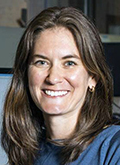
“This moves the policy center into an important new area in which communication plays a critical role,” said APPC director Kathleen Hall Jamieson.
The new climate division joins APPC’s communication science and institutions of democracy divisions, which are led, respectively, by Penn Integrates Knowledge professor Dolores Albarracín and political science professor Matt Levendusky.
Dr. Falk, a professor of communication, psychology, and marketing and the vice dean for research for the Annenberg School for Communication, directs Penn’s Communication Neuroscience Lab and studies the science of behavior change, using tools from psychology, neuroscience, and communication to explore the characteristics of persuasive messaging, and successful communication more broadly. She has been recognized as an outstanding early-career researcher by the International Communication Association, the Association for Psychological Science, the Society for Personality and Social Psychology, the National Institutes of Health, and the Defense Advanced Research Projects Agency.
The climate communication division is envisioned as a hub for interdisciplinary, translational research on climate communication and the neural, psychological, and sociological mechanisms that motivate climate action. Its work will focus on topics at both local scales (for instance, environmental justice initiatives in West Philadelphia) and global scales (such as the development and evaluation of media campaigns that communicate climate science knowledge).
“We’re hoping to bring together people from across Penn, the local community, nationally and internationally to create cutting-edge science about climate communication,” Dr. Falk said. She added that two areas were of special interest.
“One is focusing on the beliefs, attitudes, and behaviors relevant to climate in areas such as transportation, food, and energy,” she said. “The second is resilience and social connection. We’re particularly interested in working with young people to create the tools and psychological resources they need to innovate and develop new ways of thinking about climate and address the challenges we face as a global community.”
Dr. Falk said the division would collaborate closely with other research centers at Penn, including the Penn Center for Science, Sustainability, and the Media, under the leadership of Michael Mann, and her own Communication Neuroscience Lab.
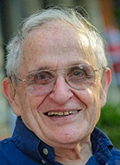
Born and raised in New York, Dr. Silvers graduated from the Ethical Culture Fieldston School in 1946. He pursued his premedical studies at Johns Hopkins University, where he remained until 1950. While at Johns Hopkins, Dr. Silvers spent several summers at the Jackson Laboratory in Bar Harbor, Maine, as part of the laboratory’s summer program. He worked with psychologist Joseph Royce on dog behavioral studies, earning scholarships for his contributions. Afterwards, he earned his PhD from the University of Chicago. Dr. Silvers dedicated himself to research upon graduating, embarking on a prestigious postdoctoral fellowship funded by the National Institute of Health at Brown University.
Dr. Silvers and his wife moved to Philadelphia in 1957. He took a position at the Wistar Institute while his wife, Abigail Silvers, began her studies at the University of Pennsylvania Medical School. Dr. Silvers was recruited to the University of Pennsylvania to help develop the department of human genetics, where he served as the chair of the genetics graduate program. His research primarily centered on pigment cell biology and transplantation biology. He coauthored The Immunobiology of Transplantation in 1971 before authoring Coat Colors of Mice , a book focusing on the genes that influence coat color in mice.
Dr. Silvers received recognition for his substantial contributions to academia, earning accolades such as the Mary F. Lindback Award for Distinguished Teaching and the Dean’s Award in Graduate Teaching. He retired from his position at Penn in 1996 but remained active in research at the Chase Cancer Center, where he focused on the development and treatment of melanomas.
Dr. Silvers is survived by children, Deborah and Kent; and grandchildren, Nicholas and Willys Kent, III.
Dr. Silvers expressed his wish for no funeral services. In lieu of flowers, contributions in his memory can be directed to the Abigail Adams Silvers Scholarship Fund, care of the Baldwin School at 701 Montgomery Avenue, Bryn Mawr, PA 19010.
To Report A Death
Almanac appreciates being informed of the deaths of current and former faculty and staff members, students and other members of the University community. Call (215) 898-5274 or email [email protected] .
However, notices of alumni deaths should be directed to the Alumni Records Office at Suite 300, 2929 Walnut St., (215) 898-8136 or email [email protected] .
The following is published in accordance with the Faculty Senate Rules. Among other purposes, the publication of SEC actions is intended to stimulate discussion among the constituencies and their representatives. Please communicate your comments to Patrick Walsh, executive assistant to the Senate Office, by email at [email protected] .
Faculty Senate Executive Committee Actions
Wednesday, April 10, 2024
Report from the Tri-Chairs. Faculty Senate Chair Tulia Falleti reported that the second “roundtable” sponsored by the Faculty Senate will be held on Thursday, April 18, at 4:30 p.m., in the Penn Carey Law School’s Fitts Auditorium. The entire Penn community is welcome to attend. Panelists include Risa Lieberwitz (professor of labor and employment law, School of Industrial and Labor Relations, Cornell University), Geoffrey Stone (Edward H. Levi Distinguished Service Professor of Law, former dean and provost, University of Chicago), and Keith Whittington (William Nelson Cromwell Professor of Politics, department of politics, Princeton University), with moderation by Sophia Rosenfeld (Walter H. Annenberg Professor of History and chair, Penn department of history). Registration and more information is available here: https://button.provost.upenn.edu/senate/are-academic-freedom-and-open-expression-under-siege .
Update from the Presidential Commission on Countering Hate and Building Community. Commission co-chairs Vijay Kumar (Nemirovsky Family Dean of SEAS) and Katharine Strunk (dean of GSE), offered an update on the commission’s work to-date and sought feedback on four discussion questions: (1) What values do you think Penn must uphold in order to ensure every member of our community feels they belong? Put another way, what should be Penn’s core values? (2) What makes you feel part of the Penn community? What has made you feel more included? Has anything made you feel excluded or feel like you did not belong? (3) If Penn were to be the ideal place to be, what would it look like? and (4) What can constituents do on campus and beyond to help move Penn towards this vision?
Nominations are open to all monthly-paid, full-time Penn staff for election to positions on PPSA’s Executive Board, as well as for potential appointment as PPSA representatives to University committees.
PPSA is a volunteer organization operated by and for all monthly-paid, overtime-exempt, University staff members. PPSA’s mission is to support and focus staff engagement and collaboration within the University of Pennsylvania community. Involvement with PPSA activities allows you to network with your colleagues through numerous workshops and events that enhance your professional development and work life at Penn.
- Provides a forum through which staff can engage in dialogue about issues facing the University and higher education
- Participates and collaborates in University governance through University Council and other committees and task forces
- Serves as an informational network to promote seminars and programs that enrich the quality of experience and work life for professional staff
- Provides a supportive network to assist the University in achieving its goals and objectives
Executive Board members assist with program development and coordination. The board meets monthly. University committee members meet regularly and are expected to report to the Executive Board periodically. Service through PPSA is a rewarding and enjoyable experience that requires only a couple of hours per month. It is a wonderful opportunity to meet colleagues from across the University who will help to enrich your work life at Penn.
Executive Committee Nominations
The following positions are open for nomination:
- PPSA Chair-Elect (1 position, three-year term of service): The chair is the principal executive officer who calls for and presides over meetings, prepares agendas, and provides leadership and representation of PPSA at University Council and University-level bodies. After one year, the chair-elect automatically succeeds to the office of chairperson.
- Members At-Large (4 positions, two-year term of service): The members at-large participate in Executive Board meetings, manage PPSA projects and events, and serve on other University committees as needed.
All monthly-paid, full-time University staff members are encouraged to self-nominate or nominate colleagues for consideration using the form by no later than May 10, 2024.
All nominees will be asked to complete a brief candidate bio and written personal statement. The final list of candidates will be announced via PPSA’s mailing list before the election.
The 2024-2025 election for officers will occur following PPSA’s annual meeting, to be held on Thursday, May 23, at noon in the Irvine Auditorium’s Café 58. Our election meeting guest will be Reverend Chaz Howard, University Chaplain and Vice President for Social Equity & Community. Lunch will be served.
All full-time, monthly-paid University staff members are welcomed and encouraged to attend the meeting as guests of PPSA. A registration form will be sent via email to members of the PPSA listserv. You may register for the listserv by visiting http://ppsa.upenn.edu .
University Committee Nominations
PPSA invites you to nominate yourself or others for a one-year service term on other University committees, including the 2024-2025 University Council Committees. The Council committees, which also include faculty and student members, serve as advisory bodies, and play important roles in shaping academic and administrative policy across the campus. Please consider taking advantage of this opportunity to learn about the administrative structure of the University and have input into its decision-making.
For more information on the work of the University Council committees, visit https://secretary.upenn.edu/univ-council/committees .
University committee members will be appointed by the PPSA tri-chairs from among all applicants following the election.
Questions on the nomination and election process can be directed to [email protected] . The election process is governed by the PPSA Bylaws, available on the PPSA website at http://ppsa.upenn.edu .
To nominate yourself or someone else, please fill out the form here: https://upenn.co1.qualtrics.com/jfe/form/SV_9ujkxzN3paXj5rM .
—Penn Professional Staff Assembly (PPSA)
The University’s merit increase program is designed to recognize and reward the valuable contributions of faculty and staff to the University’s commitment to the highest levels of excellence in teaching, research, and administration by paying market-competitive salaries in a fiscally responsible manner.
Presented below are the merit increase guidelines for July 1, 2024.
Faculty Increase Guidelines
Below are the standards for faculty increases that the deans are asked to follow. The deans will give the department chairs their guidelines at the school level regarding available resources.
- The minimum academic salary for new assistant professors will be $88,914.
- Merit increases for faculty should be based solely on performance as evidenced by scholarship, research, teaching, and service to the University and the profession.
- The aggregated merit increase pool for faculty will be 3.75 percent. Some schools and centers may have financial constraints that can only support budget growth of less than 3.75 percent. Salary increase recommendations that are below 1.0 percent for non-meritorious performance, as contrasted with general limits applied to an entire class of faculty, must be made in consultation with the Provost. Likewise, salary increases that exceed 5.0 percent must also be made in consultation with the Provost. Deans may wish to give careful consideration to salary adjustments for faculty who have a strong performance record but whose salaries may have lagged behind the market.
Staff Increase Guidelines
- The aggregated merit increase pool for staff will be 3.75 percent. The merit increase range is zero to 5.0 percent. Individual merit increases may not exceed 5.0 percent regardless of a staff member’s performance rating.
- Staff in monthly-paid, weekly-paid, or limited service positions are eligible for a merit increase if their time type is full-time (including phased retirement) or part-time and they were employed by the University on or before February 29, 2024. The following groups are not eligible: student workers, contingent workers, temporary workers, interns, residents, staff on unpaid leave of absence, staff on long term disability, and staff who are covered by collective bargaining agreements.
- The merit increase program is designed to recognize and reward performance. The foundation of this program is the Performance Review in Workday. Salary increases should be based on performance contributions within the parameters of the merit increase budget. The Performance Review in Workday documents each staff member’s performance and contributions and establishes performance goals for the new fiscal year. All staff must receive a performance review for the next review cycle whether or not they receive merit increases. Schools and centers are requested to submit performance reviews by June 7, 2024. The Division of Human Resources/Staff and Labor Relations is available to discuss performance management issues.
- Aggregated merit increases within a school or center may not average more than 3.75 percent regardless of staff performance rating distributions, however, may average less if a school or center establishes a lower percentage merit pool based on financial constraints. Performance expectations should be raised each year as staff grow in experience and job mastery. Performance ratings and merit increases should reflect a normal distribution for all staff. Staff members with unacceptable performance are not eligible for a merit increase.
- The merit increase program does not include bonuses, the same as in prior years.
Division of Human Resources/Compensation is available to discuss specific merit increase parameters with schools and centers.
— John L. Jackson, Jr., Provost —Craig Carnaroli, Senior Executive Vice President
Penn Arts & Sciences has named 20 students from the College of Arts & Sciences, the College of Liberal & Professional Studies, and the Graduate Division as 2024 Dean’s Scholars. This honor is presented annually to students who exhibit exceptional academic performance and intellectual promise. The students will be recognized at the Stephen A. Levin Family Dean’s Forum on April 17.
College of Arts & Sciences
Natascha Barac, C’23, English and Physics Rema Bhat, C’24, Political Science Sophie Faircloth, C’24, Linguistics, submatriculation in Linguistics Andreas Ghosh, C’24, VIPER: Physics, Chemical and Biochemical Engineering Sophia Mwaisela, C’24, History William (Zijian) Niu, C’24, Biochemistry, Chemistry, and Biophysics Liam Phillips, C’24, Russian and East European Studies and Comparative Literature William Stewart, C’25, Music Yijian (Davie) Zhou, C’24, Philosophy and Psychology, submatriculant in Philosophy College of Liberal & Professional Studies—Undergraduate Program Joe Daniel Barreto, LPS’23, Bachelor of Applied Arts and Sciences
Professional Master’s Programs
Abigail P. Blyler, Master of Applied Positive Psychology Graduate Division—Doctoral Programs Adwaita Banerjee, Anthropology Charlie Cummings, Physics and Astronomy Cianna Z. Jackson, Classical Studies Ryann Michael Perez, Chemistry Rashi Sabherwal, Political Science Timmy Straw, Comparative Literature and Literary Theory Elena Gayle van Stee, Sociology Christine Soh Yue, Linguistics Oscar Qiu Jun Zheng, East Asian Languages and Civilizations

Developed by the ADA New Dentist Committee in 2017, the ADA 10 Under 10 Award recognizes 10 dentists nationwide who graduated from a dental school accredited by the Commission on Dental Accreditation within the last 10 years. Winners are selected for demonstrating excellence in their work and inspiring others in science, research & education, practice excellence, philanthropy, leadership, and advocacy. This year’s awardees were chosen from over 145 submissions reviewed by the ADA.
“Being a national ‘10 Under 10’ Award winner is a dream come true,” said Dr. Kulkarni. “It is such an honor to be recognized alongside so many inspiring new dentists who have already influenced the landscape of our profession.”
Last year, Dr. Kulkarni was recognized with a similar award at the state level, receiving the inaugural 10 Under 10 Award from the PDA. The PDA award highlights and celebrates the outstanding contributions of new dentists who have made significant contributions to their professions, their communities, and organized dentistry.
Dr. Kulkarni was honored again by the PDA this year with the 2024 PDA Recognition Award. Each year, this award is given to a member of the PDA who has contributed original research, whose achievements and high standards have aided and advanced the science and art of dentistry, or whose public life and activities reflect great credit upon the health profession.

The George Gerbner Fellowship, named in honor of the school’s second dean, is awarded in alternate years to a graduate of Penn’s Annenberg School for Communication or USC’s Annenberg School for Communication and Journalism. The faculty of the opposite school selects the recipient from the group of applicants.
Ms. Robertson will earn her PhD in communication in May 2024 after completing her dissertation, “The Stadium and the Community: Refusal, Resistance, and Negotiation Around Los Angeles’ Olympic Stadiums.”
Her research investigates the politics of stadium-centered development in Los Angeles in the context of the region’s preparations to host the Olympics in 2028. At USC, she received the Haynes Lindley Doctoral Dissertation Fellowship for 2022-2023 and the Annenberg Graduate School Fellowship for 2023-2024.
Before beginning her doctoral work at Annenberg, Ms. Robertson completed a master’s degree in sociology at the University of Cambridge, where her thesis also related to the Olympics: “Contesting the Media Event: Alternative Media at the Rio 2016 Olympics.” She also holds a bachelor’s degree in social studies from Harvard University.
Ms. Robertson focuses on how power is formed, networked, wielded, and challenged in contests over cities’ futures. She researches spectacular urban development projects and sports mega-events, as well as everyday struggles for survival and dignity.
Ms. Robertson’s work has appeared in academic journals such as International Journal of Communication , Journal of Urban Technology , Interface , and Communication & Sport . She has been invited to write book chapters that have been published in Oxford University Press and Routledge.
She has worked in the United States, South Africa, Botswana, Germany, and Brazil. Her academic service includes ad hoc reviews for the Journal of Urban Affairs and International Journal of Communication. In May 2022, she co-organized a panel at the International Communication Association conference, “Olympics, Media, Discourse, and Power.” She has also presented at other conferences, including those of the American Association of Geographers, North American Society for the Sociology of Sport, and American Sociological Association.
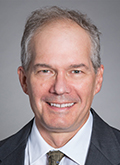
Dean Sniegowski, a professor of evolutionary biology, has been a member of the Penn faculty for 27 years. He oversaw the College’s transition to remote learning during the COVID-19 pandemic. His accomplishments include the creation of the First-Generation, Low-Income Dean’s Advisory Board and overseeing the creation of the environmental humanities and data science minors.
From 2012 to 2016, Dean Sniegowski chaired the school’s Committee on Undergraduate Education. He has also chaired the Faculty Senate Committee on Students and Educational Policy, served on the faculty advisory boards of the College of Liberal & Professional Studies and the Center for Teaching and Learning, and chaired the School of Arts & Sciences’ Teaching Awards Committee. From 2011 to 2017, he served as the disciplinary hearing officer for Penn’s Office of Student Conduct and the Sexual Violence Investigative Office.
“Paul has promoted inclusion in the undergraduate learning experience through a number of means,” Dean Fluharty said in an announcement. “Being named to a college presidency is a tremendous honor, and Paul’s appointment at Earlham is a well-deserved tribute to his devotion to student learning and to liberal arts education.”
Earlham College is a Quaker college located in Richmond, Indiana.
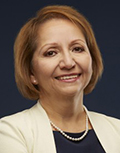
Dean Villarruel was honored with this designation because she has had a career of firsts. She was the first Latina dean at an Ivy League nursing school, Penn Nursing, which she has led for nearly a decade. Dean Villarruel was also the first (and to date, the only) Latina nurse inducted into the National Academy of Medicine. She was in the first generation of her Detroit Mexican American family to go to college. Now she is part of the first generation of American nurses to earn a PhD, reaching the top echelon of academia with her groundbreaking research on sexual health.
At Penn Nursing, Dean Villarruel was the first dean to secure her own National Institutes of Health research funding. Her cross-cultural investigations of sexual health, which she began as a graduate student at Penn, led to an intervention program used as a national model.
“I’m proud of being able not only to do that research, but also disseminate it in vulnerable communities,” said Dean Villarruel, who directs the WHO Collaborating Center for Nursing and Midwifery Leadership. She received her award in late March at the annual City & State Pennsylvania Above & Beyond Awards Gala at the Fitler Club in Center City, Philadelphia.
The University of Pennsylvania School of Nursing (Penn Nursing) holds its number one spot as the world’s leading nursing school, according to a recent ranking by QS World University . The rankings highlight the world’s top universities in 55 different subject areas from 1,559 institutions, of which 64 universities are new to the rankings.
“All of us at Penn Nursing are incredibly proud to be ranked the #1 nursing school in the world for the ninth consecutive year,” said Penn Nursing dean Antonia M. Villarruel. “This ranking affirms our school’s leadership in advancing health equity and meeting the educational needs of the broader health care community—needs that continue to rapidly evolve. Penn Nursing is prepared to solve care challenges and advance health equity by innovating. It’s the throughline in everything we do, and this ranking is an indicator of our success.”
A new study from the University of Pennsylvania School of Nursing’s Center for Health Outcomes and Policy Research (CHOPR)—published in JAMA Network Open —showed that, aside from retirements, poor working conditions is the leading reason nurses leave healthcare employment. These study findings come at a time when hospital executives cite staffing problems as their most pressing concern.
“Prior studies evaluate nurses’ intentions to leave their job. Our study is one of the few evaluating why nurses actually left healthcare employment entirely,” said lead author K. Jane Muir, a CHOPR postdoctoral research fellow, an associate fellow of the Leonard Davis Institute for Health Economics, and a National Clinician Scholar at the University of Pennsylvania. The study surveyed 7,887 registered nurses in New York and Illinois who left healthcare employment between 2018 and 2021.
Across a variety of healthcare settings including hospitals, long-term care facilities, and ambulatory care, planned retirement was the most cited reason nurses are leaving healthcare employment. Closely behind retirements, insufficient staffing, burnout, and poor work-life balance topped the list. Among retired nurses in the study, only 59% stated that their retirement was planned, suggesting nearly half of nurse retirements are premature exits due to poor working conditions.
“Nurses are not principally leaving for personal reasons, like going back to school or because they lack resilience,” said senior author Karen Lasater, an associate professor of nursing, the Jessie M. Scott Term Chair in Nursing and Health Policy, and a senior fellow of the Leonard Davis Institute for Health Economics. “They are working in chronically poorly staffed conditions which is an ongoing problem that predates the pandemic.”
The study authors say that healthcare employers could also retain more nurses through solutions that enhance nurses’ work-life balance. This includes greater flexibility in work hours, such as shorter shift-length options, higher pay-differentials for weekend/holiday shifts, and on-site dependent care.
“Nurses are retiring early and leaving employment in the healthcare sector because of longstanding failures of their employers to improve working conditions that are bad for nurses and unsafe for patients,” said Dr. Muir. “Until hospitals meaningfully improve the issues driving nurses to leave, everyone loses.”
Adapted from a Penn Nursing news release , April 9, 2024.
On April 5, people in the Northeast, including many at Penn, experienced an unusual disruption to their day as the ground beneath and walls around started to shake for about half a minute. The magnitude 4.8 earthquake was, for some, a once-in-a-lifetime occurrence. Centered in New Jersey, the quake did little damage.
To learn more about the mechanics of earthquakes and to discuss this rare event, Penn Today spoke with David Goldsby, a professor and department chair of Earth & environmental science in the School of Arts & Sciences, and Robert Carpick, the John Henry Towne Professor in the department of mechanical engineering and applied mechanics in the School of Engineering and Applied Science.
What is an earthquake, and what causes quakes like the one that hit the East Coast?
Dr. Carpick: Simply put, an earthquake is a sudden and dynamic geologic event caused by the movement of pieces of the Earth’s crust pushing against each other.
Imagine standing on a sidewalk where there’s some dirt and small pebbles between your leading foot and said sidewalk. If you try push that foot forward, it won’t move at first, but with more and more force it’ll eventually slip and might slide quite suddenly.
Dr. Goldsby: Over time, as force accumulates, these pieces can no longer withstand the energy without moving, leading to a sudden slip; this is the essence of an earthquake. An earthquake occurs when there’s a sudden displacement along a fault, a crack in the Earth’s crust. Before the earthquake, this fault is “locked,” accumulating stress over time until the force surpasses the fault’s frictional strength, leading to a rapid slip. This process not only causes the ground to shake, but also releases accumulated elastic strain energy from the surrounding rocks, which is then partly transformed into seismic waves that propagate from the earthquake’s origin.
Does Philadelphia lie near a fault line?
Dr. Carpick: Philadelphia is about 70 miles south of the Ramapo fault zone, which runs through New York, New Jersey, and Pennsylvania. The closest parts of that fault system are between Doylestown and Easton, Pennsylvania.
Dr. Goldsby: Overall, there are certainly myriad faults below and near Philly, but there are no major fault lines that would produce major devastating earthquakes.
Do your research interests overlap with earthquakes?
Dr. Carpick: David and I have been funded by the National Science Foundation to look at the underlying physics and mechanics of earthquakes, trying to get at the atomic-level processes that precede the sliding events. It will take a lot of work, but eventually we hope what we’re learning can, combined with the work of many others, lead to ways to actually predict earthquakes and how they will behave.
Adapted from a Penn Today article by Nathi Magubane, April 9, 2024.
Due to the many technical difficulties studying Cryptosporidium, scientists have struggled for many years to advance research on the single-celled parasite, which is one of the leading causes of deadly diarrheal disease. Multiple breakthroughs in the past decade, said biologist Boris Striepen of Penn’s School of Veterinary Medicine, have made this a tractable pathogen and disease.
With support from the Bill & Melinda Gates Foundation and the National Institutes of Health, the Striepen Lab and others have pursued an ambitious research agenda. Genetic engineering of the parasite, along with new culture and animal models, enabled progress toward drugs and vaccines. For the first time in many years, new candidate drugs have now entered human trials.
Dr. Striepen and Christopher Hunter, also of Penn Vet, sought to amplify these advances by organizing the First Biennial Cryptosporidium Meeting, held at Penn. It included academic researchers from across disciplines, scientists from leading pharmaceutical companies, representatives of United States and international public health agencies, and leading clinicians from some of most impacted countries, including Zambia, Kenya, Colombia, Bangladesh, and India.
“There had been transformational progress, and we thought this a great opportunity to bring everybody together to ask,” Dr. Striepen said. “Now that we have the tools to address this problem, where is the field and what should we do next?”
He stresses the gravity of cryptosporidiosis—the disease caused by the parasite—and the importance of finding drugs and vaccines. The conference spanned the field, from the fundamental biology of the life cycle of Cryptosporidium to the state of drug development and challenges of clinical trials for the disease, which is most prevalent in highly vulnerable babies and toddlers.
Dr. Striepen said 10% of child mortality worldwide comes from diarrheal disease, and, after rotavirus, Cryptosporidium is a main cause. The disease tracks with poverty, and low-income regions are most affected. “It has this vicious cycle relationship with malnutrition, so malnourished kids are very susceptible,” he said, “but having this infection also sets kids up for future malnutrition.”
Dr. Striepen is hopeful not only because of how much progress has been made on Cryptosporidium but also because of how many young scientists and physicians attended the conference. Two such people are fifth-year immunology PhD student Breanne Haskins and postdoctoral fellow Aurelia Balestra, who both came to Penn specifically to work on Cryptosporidium.
Ms. Haskins works on the T cell response to the parasite, which she said is important because people who lack T cell responses can remain chronically infected or suffer from repeat infections. Ms. Haskins adds that the lone FDA-approved drug is not effective in some individuals, such as those with HIV/AIDS. Specifically, Ms. Haskins researches the components from the parasite and host that are necessary to induce T cells, which she said could potentially identify future vaccine targets.
Along with the negative impact Cryptosporidium infection has on children and the need for a vaccine, one of Ms. Haskins’ takeaways from the conference was that many cases go undiagnosed because diagnostic tools aren’t accessible in lower-income countries. Ms. Balestra added that cryptosporidiosis is not on the World Health Organization’s list of neglected tropical diseases, despite meeting the criteria. She argues that including it is critical to increasing awareness, securing funding, and improving disease monitoring.
In a session with other molecular biologists at the conference, Ms. Balestra gave a talk about sexual development and fertilization in Cryptosporidium. She explains that, just as humans have sperm and eggs, Cryptosporidium produces male and female gametes. However, these parasite gametes differ significantly from human ones, so scientists don’t know how the male and female gametes fuse to form a zygote. Her research focuses on finding out, and she has demonstrated that sexual development is essential for the parasite’s growth.
Adapted from a Penn Today article by Erica Moser, April 2, 2024.
On Wednesday, April 24 at 3 p.m., Jamila Michener, an associate professor of government at Cornell University and this year’s Provost’s Distinguished Visiting Faculty Fellow, will deliver the Provost’s Lecture on Diversity: Power From the Margins and the Promise of Democracy .
Pundits, scholars, and ordinary people alike lament the decline of democracy in the contemporary United States. Trust in democratic institutions is at a nadir while political cynicism and support for authoritarianism are on the rise. In this broader context of political malaise, where are the avenues for building a more robust democratic polity? Drawing on insights from qualitative research, Dr. Michener will highlight how building power within racially and economically marginalized communities around issues directly related to their material interests (like health and housing) is a promising pathway. Grassroots political organizing is (perhaps unexpectedly) an antidote to the social cleavages that accelerate democratic backsliding. Such organizing can forge a route to transforming both the polity and the political economy so that both are more attuned to communities that teeter at the margins of the existing power structures.
The lecture will be held in Michael A. Fitts Auditorium at the Penn Carey Law School and is sponsored by the Office of the Provost.
Please register at https://upenn.co1.qualtrics.com/jfe/form/SV_e3euXcpGXKgbH0i .

April 20-26
Earth Week presents an opportunity for students, faculty, and staff to engage in cross-disciplinary events designed to educate and inspire action. This year’s theme is Restore & Regenerate —to inspire us to think of what replenishes and revitalizes our planet’s natural systems while building community. Earth Week elevates our collective impact by encouraging involvement from all schools and centers at Penn.
A calendar of events is available on the Penn Sustainability website. Activities include campus tours, panel discussions, craft projects, e-waste drives, and exhibits. Some highlights:
- April 22– Create and print your own greeting cards with Penn Libraries.
- April 23 and 25– Dispose of your e-waste and learn about composting at Penn Carey Law.
- April 24– Volunteer to help prepare Penn Farm for a new growing season.
- April 26– Learn about the impacts of lead exposure to people, wildlife, and the environment.
- April 26– Visit GreenFest, a long-running Penn tradition for student organizations to share their visions and projects related to environmental sustainability.
There is still time for your school or center to host an event for Earth Week. Use this online submission form to participate, or email [email protected] .
Children’s Activities
Penn Museum
Info: https://www.penn.museum/calendar .
23 K-12 Archaeology Talk with Dr. Steve: The Sphinx That Moved to Philadelphia ; gives students exclusive, behind-the-scenes access to Dr. Phillips’ own work as a team member excavating Petra’s Temple of the Winged Lions; 11 a.m.; Rainey Auditorium, Penn Museum; tickets: $15.
Conferences
17 Physics of Soft Matter: Self-Assembling, Responsive, Smart (and Squishy!) ; conference honoring David Weltz, recipient of the 2024 Bower Award and Prize for Achievement in Science; 8-11:15 a.m.; room 419, Fisher-Bennett Hall; info: https://www.lrsm.upenn.edu/event/fi-award-david-weitz/ (LRSM).
19 To Make the Revolution Irresistible: The Role of the Artist in the 21st Century ; seeks to address the question of political artmaking practices, and shed light on artists that make community-oriented and public-facing work; 7-8 p.m.; Public Trust, 4017 Walnut Street; info: https://wolfhumanities.upenn.edu/events/make-revolution-irresistible (Wolf Humanities Center, Cinema & Media Studies). Also April 20 , 10 a.m.-6 p.m.; Class of 1978 Orrery Pavilion, Van Pelt Library.
18 Early Access Screening: Robot Dreams ; Dog lives in Manhattan and he’s tired of being alone; one day he decides to build himself a robot; their friendship blossoms, until they become inseparable, to the rhythm of 80’s NYC; 7 p.m.; Heyer Sky Lounge in Harrison College House; RSVP: https://tinyurl.com/robot-dreams-apr-18 (Cinema & Media Studies).
Fitness & Learning
17 Trans-Affirming Pedagogy in Language Classrooms: Creating and Modifying Course Materials ; participants will learn practical approaches to trans-affirming pedagogy in language classrooms and discuss specific strategies for creating and modifying course materials that rely on gendered terms across languages; noon; room 134, Van Pelt Library; register: https://tinyurl.com/cetli-workshop-apr-17 (Center for Excellence in Teaching, Learning & Innovation).
Graduate School of Education
Info: https://www.gse.upenn.edu/news/events-calendar .
18 Crisis, Capacity, Cognition, & Collective Intelligence ; 8:30 a.m.-3 p.m.; 5 th floor, 3440 Market Street.
Penn Chief Learning Officer Virtual Information Session ; noon; online webinar.
23 Education Entrepreneurship Virtual Information Session ; noon; online webinar.
19 (Deep) Listening: Reflection ; soulful (deep) listening session that will contain spacious and sultry explorations of jazz, R&B, and hip-hop histories by a range of exciting experimental artists, including performances by keiyaA, St. Sol, and DJ Love; 7 p.m.; Institute of Contemporary Art; register: https://tinyurl.com/ica-listening-apr-19 (Institute of Contemporary Art).
18 Theatre Arts Program: She Kills Monsters ; tells the story of Agnes Evans as she leaves her childhood home in Ohio following the death of her teenage sister, Tilly; when Agnes finds Tilly’s Dungeons & Dragons notebook, however, she finds herself catapulted into a journey of discovery and action-packed adventure in the imaginary world that was her sister’s refuge; 7 p.m.; Bruce Montgomery Theater, Annenberg Center; free admission; register: https://tickets.pennlivearts.org/0/89142 (Penn Live Arts). Also April 19 and 20 , 7 p.m.; April 21 , 2 p.m.
Readings & Signings
22 The Paradox of Violence in Venezuela: Revolution, Crime, and Policing During Chavismo ; David Smilde, Tulane University; Verónica Zubillaga, Brown University; noon; room 403, McNeil Building (Center for Latin American & Latinx Studies).
Kelly Writers House
Unless noted, in-person events at Arts Café, Kelly Writers House. Info: https://writing.upenn.edu/wh/calendar/0424.php .
22 New Translations from Kharkiv, Ukraine ; Katerina Derysheva, Ukrainian poet; noon.
16 Activation and Incorporation of Rare Sugars Into Bacterial Surfaces ; Tania Lupoli, New York University; noon; Carolyn Hoff Lynch Lecture Hall, Chemistry 1973 Building (Chemistry).
What’s Gender Got to Do With It? ; Kate Gilmore, Planned Parenthood; 12:30 p.m.; World Forum, Perry World House; register: https://tinyurl.com/gilmore-talk-apr-16 (Perry World House, Gender, Sexuality & Women’s Studies).
The Enemy’s Property ; Theodore Hughes, Columbia University; 5:15 p.m.; room 402, Cohen Hall (East Asian Languages & Civilizations).
17 Why Listening Matters ; Matthew Levendusky, political science; 11:50 a.m.; Ben Franklin statue, College Hall (60 Second Lectures).
Engineering in the Age of AI ; Michael Kearns and Surbhi Goel, computer & information science; René Vidal, Rachleff University; noon; online webinar; register: https://pennengdean.wufoo.com/forms/q1ierf5b1j1s59o/ (Penn Engineering).
The James Webb Space Telescope: A New Era for Space Exploration ; Mike McElwain, NASA; 3:30 p.m.; room 4E19, DRL (Physics & Astronomy).
Miguel De Cervantes Meets Pedro Almodovar ; Bruce Burningham, Illinois State University; 5:30 p.m.; room 401, Fisher-Bennett Hall (Spanish & Portuguese, Cinema & Media Studies).
Decolonization, Ethnonationalism, and the Soviet Union: A View from South Africa ; Hilary Lynd, University of California, Berkeley; 6 p.m.; room 543, Williams Hall (Comparative Literature).
Evolution of HIV/AIDS Research: Past, Present, and Future Perspectives ; Steven Meanley, Penn Nursing; Ron Collman, Center for AIDS Research; Alfred Giosa, Penn Nursing; 8 p.m.; LGBT Center; register: https://tinyurl.com/lgbt-center-talk-apr-17 (LGBT Center).
18 Molecular and Micro-Structural Mechanics and Design of Soft Materials ; Mary C. Boyce, Columbia University; 11 a.m.; Glandt Forum, Singh Center for Nanotechnology (Mechanical Engineering & Applied Mechanics).
Living the Hard Promise: Understanding Social Media Discourse in Times of Crises ; Guobin Yang, communication; noon; Café 58, Irvine Auditorium; register: https://tinyurl.com/yang-talk-apr-18 (Knowledge By the Slice).
Miniaturized Biomedical Devices for Navigation, Sensing and Stimulation ; Saransh Sharma, Massachusetts Institute of Technology; noon; room 327, Towne Building (Electrical & Systems Engineering).
“We Will Put Them Out”: The Legal and Imperial Formations of Anti-Asian Violence in Twentieth Century America ; Hardeep Dhillon, Asian American studies; noon; room 240A, Silverman Hall, and Zoom webinar; join: https://tinyurl.com/dhillon-talk-apr-18 (History, Carey Law School).
Using Computers to Derive Protein Structure from Sparse Data – A Case Study for Mass Spectrometry ; Steffen Lindert, Ohio State University; 3:30 p.m.; room 225, Towne Building (Bioengineering).
Epigenetic Analysis of Lung Progenitor Function During Development, Regeneration, and Disease ; William Zacharias, Cincinnati Children’s Medical Center; 4 p.m.; room 11-146, Smilow Center (Penn-CHOP Lung Biology Institute).
The Labors of Resurrection: Necromancy and the Democratic Storytelling of W.E.B. Du Bois and Toni Morrison ; Shatema Threadcraft, Vanderbilt University; 4:30 p.m.; room 250, PCPSE (Africana Studies).
Temple Tracks: Labor, Piety, and Railway Construction in Asia ; Vineeta Sinha, National University of Singapore; 5:15 p.m.; room 110, Annenberg School (Center for East Asian Studies, South Asia Center).
Narratives of the Deluge ; Emma Mendel, McHarg Fellow; 6 p.m.; room B3, Meyerson Hall (McHarg Center).
19 Semantics, Typology ; Dorothy Ahn, Rutgers University; 10:15 a.m.; room 401, Fisher-Bennett Hall (Linguistics).
Physics-Compatible Kinetic-Energy and Entropy Preserving (KEEP) Scheme for High-Fidelity Simulation of Compressible Turbulence ; Soshi Kawai, Tohoku University; 2 p.m.; room 534, 3400 Market Street (Penn Institute for Computational Science).
“Kikrevou”(kì ire aiku): Sickness, Death, and Survival in the Jamaican Smallpox Epidemic of 1768 ; Elise Mitchell, Princeton University; 3 p.m.; McNeil Center for Early American Studies; more info: https://www.mceas.org/events/2024/04/19/kikrevouki-ire-aiku-sickness-death-and-survival-jamaican-smallpox-epidemic-1768 (McNeil Center).
23 Flows About Superhydrophobic Surfaces ; Ehud Yariv, Technion; 10 a.m.; room 101, Levine Hall (Mechanical Engineering & Applied Mechanics).
Genetic Testing for Obesity Risk: Ethical & Social Considerations ; Cassie Houtz, medical ethics & health policy; noon; room 1402, Blockley Hall, and Zoom webinar; register: https://tinyurl.com/houtz-talk-apr-23 (Medical Ethics & Health Policy).
Sex, Courtship, and Bird Behavior Go High Tech ; Marc Schmidt, biology; 6 p.m.; Morris Arboretum & Gardens; register: https://tinyurl.com/schmidt-talk-apr-23 (Penn Science Café).
In-person events at various locations. Info: https://economics.sas.upenn.edu/events .
17 Sustainable Pension Plans ; Artemii Korolkov, economics; 12:45 p.m.; room 100, PCPSE.
Voting as Differentiated Products: Estimates from Multi-Level Data ; Steven Berry, Yale University; 3:30 p.m.; room 100, PCPSE.
19 Bond Market Views of the Fed ; Luigi Bocola, Stanford University; 4 p.m.; room 100, PCPSE.
22 How the Ramsey Formula Came to Define Discounting in Economics (1950-2000) ; Beatrice Cherrier, CNRS, CREST and Ecole Polytechnique; noon; room 250, PCPSE.
23 Collective Upkeep ; Erik Madsen, New York University; 4 p.m.; room 100, PCPSE.
Asymmetric Shocks and Heterogeneous Worker Mobility in a Monetary Union ; Joseph-Simon Goerlach, Bocconi University; 4 p.m.; room 250, PCPSE.
This is an update to the April AT PENN calendar , which is online now. Email [email protected] to submit events for a future AT PENN calendar or weekly update.
Division of Public Safety University of Pennsylvania Police Department Crime Report
About the Crime Report: Below are the Crimes Against Persons and/or Crimes Against Property from the campus report for April 1-7, 2024 . The Crime Reports are available at: https://almanac.upenn.edu/sections/crimes . Prior weeks’ reports are also online. –Eds.
This summary is prepared by the Division of Public Safety (DPS) and contains all criminal incidents reported and made known to the Penn Police, including those reported to the Philadelphia Police Department (PPD) that occurred within our patrol zone, for the dates of April 1-7, 2024 . The Penn Police actively patrol from Market Street to Baltimore Avenue and from 30 th Street to 43 rd Street in conjunction with the Philadelphia Police.
In this effort to provide you with a thorough and accurate report on public safety concerns, we hope that your increased awareness will lessen the opportunity for crime. For any concerns or suggestions regarding this report, please call DPS at (215) 898-7297. You may view the daily crime log on the DPS website .
Penn Police Patrol Zone
Market Street to Baltimore Avenue and from 30 th Street to 43 rd Street
Philadelphia Police 18th District
Schuylkill River to 49th Street & Market Street to Woodland Avenue
Below are the Crimes Against Persons from the 18th District: 5 incidents were reported for April 1-7, 2024 . by the 18 th District, covering the Schuylkill River to 49th Street & Market Street to Woodland Avenue.
The Division of Public Safety offers resources and support to the Penn community. DPS developed a few helpful risk reduction strategies outlined below. Know that it is never the fault of the person impacted (victim/survivor) by crime.
- See something concerning? Connect with Penn Public Safety 24/7 at (215) -573-3333.
- Worried about a friend’s or colleague’s mental or physical health? Get 24/7 connection to appropriate resources at (215) 898-HELP (4357).
- Seeking support after experiencing a crime? Call Special Services - Support and Advocacy resources at (215) 898-4481 or email an advocate at [email protected]
- Use the Walking Escort and Riding services available to you free of charge.
- Take a moment to update your cellphone information for the UPennAlert Emergency Notification System
- Download the Penn Guardian App which can help Police better find your location when you call in an emergency.
- Access free self-empowerment and defense courses through Penn DPS.
- Stay alert and reduce distractions; using cellphones, ear buds, etc. may limit your awareness.
- Orient yourself to your surroundings. (Identify your location, nearby exits, etc.)
- Keep your valuables out of sight and only carry necessary documents.
- Rowan Today
- First-Year Admissions
- Transfer Admissions
- Financial Aid
- Graduate Admissions
- Medical Education Admissions
- International Admissions
- Tours & Open Houses
- Online Learning
- Degree Completion
- Colleges & Schools
- Degrees & Programs
- Courses, Schedules & Registration
- Student Success
- International
- Winter & Summer Sessions
- Camden Campus
- Rowan University Libraries
- The Arts at Rowan
- Athletics & Sports Recreation
- Health & Safety
- Housing & Dining
- Technology on Campus
- Entertainment & Culture
- Rowan Thrive
- Cooper Medical School of Rowan University (MD)
- Virtua Health College of Medicine & Life Sciences (DO)
- Shreiber School of Veterinary Medicine (DVM)
- Office of Research
- Research Centers & Institutes
- South Jersey Technology Park
- Research News
- Military/Veterans
- Our Past, Present & Future
- Visiting Rowan
- Working at Rowan
- Rowan Fast Facts
- Giving to Rowan
- News & Events
Job Postings
Welcome to rowan university’s career site.
A top 100 national public research institution, Rowan University offers bachelor’s through doctoral and professional programs in person and online to 22,000 students through its main campus in Glassboro, N.J., its medical school campuses in Camden and Stratford, and five others. The University has earned national recognition for innovation, commitment to high-quality, affordable education, and developing public-private partnerships. A Carnegie-classified R2 (high research activity) institution, Rowan has been recognized as the fourth fastest-growing public research university, as reported by The Chronicle of Higher Education. For more information on Rowan University, click here
All positions are contingent upon budget appropriations.
Please send any inquiries to [email protected]
Director, Rowan-Virtua SOM Health Sciences Libraries
Apply now Job no: 499467 Work type: Regular Full-Time Location: Stratford, New Jersey Categories: Library
Job Title: Director, Rowan-Virtua SOM Health Sciences Libraries
Department: Rowan University Libraries
Reports to: Associate Provost for Library Information Services
Rowan University Libraries seeks a customer-service-oriented, collaborative, and entrepreneurial leader to serve as our next Director of the Rowan-Virtua SOM Health Sciences Libraries.
Job Description & Core Functions
The Director is responsible for leadership and management of all aspects of the Hope Brings Strength Library in Stratford, NJ, and the Information Commons in Sewell, NJ (collectively referred to as the Health Sciences Libraries) including personnel management, organization and administration, strategic planning, fiscal management, and policy and program development. The Director supervises a team of four full-time health sciences librarians, the Access Services Supervisor, and a part-time Administrative Assistant, as well as indirectly supervising an additional four full- and part-time staff and a varying number of student workers. In partnership with university research administration, they advise researchers in the evaluation of grant opportunities and in meeting funder and university requirements for providing public access to research publications and data. They work closely with administrators, faculty, staff, and students to promote the missions of Rowan-Virtua SOM and Rowan University Libraries (RUL). As a member of the RUL Leadership Team, they participate in library planning and serve on library-wide committees, task forces, and teams.
Rowan-Virtua School of Osteopathic Medicine
The Director is a member of the RV-SOM Dean’s leadership team, representing the Health Sciences Libraries on various committees, including the Curriculum Committee and the Admissions Committee, and/or designating representatives from among their direct reports. The Director works closely with the Dean of Curriculum and the Dean of Students to ensure RV-SOM students, staff, and faculty have access to and training in the use of information resources they require in their instructional, research, and clinical roles. The Director guides their librarians in supporting both the Problem-Based Learning and the Synergistic Guided Learning curricula, and in providing instruction in core medical research skills. The Director is also responsible for promoting the professional development and growth of their team, cultivating a collegial, collaborative workplace culture guided by a philosophy of service excellence. The Director is likewise responsible for fostering an inclusive and collegial environment that supports the information needs of a diverse group of end-users, including students, staff, faculty, and administrators.
Rowan-Wide Services
The Director ensures that the Systems Librarian, Access Services Supervisor, and Administrative Assistant coordinate with their Glassboro- and Camden-based colleagues to ensure seamless provision of acquisitions, technology, and access services. The Director sponsors the Access Services Committee to provide a cross-campus forum for surfacing and addressing ongoing operational issues across libraries and identifying and implementing changes to enhance these services, which notably include Interlibrary Lending and the provision of Course Reserves.
Libraries Leadership Team
The Director is a key member of the RUL Leadership Team, managing the operations of two of its six locations and serving as the Leadership Team’s primary oversight for several of RUL’s most essential shared services, which fall under the Access Services umbrella. They also coordinate with the other RUL directors to ensure robust support for faculty, staff, and students on the Stratford and Sewell Campuses for those shared services managed by the other directors. In collaboration with the Libraries Leadership Team, the Director of RV-SOM Health Sciences Libraries ensures that Rowan University Libraries lives up to its mission to anticipate and fulfill the curricular, research, and clinical information needs of the Rowan community.
Partnerships
The Director builds key relationships with leadership in the Virtua Health College of Medicine & Life Sciences, and with the Graduate Medical Education teams at various institutions that partner with RV-SOM to host clerkships, residencies, and other medical education opportunities, ensuring robust and functional communication about service needs and support. The Director also coordinates with the Director of the CMSRU Library and the Director of the Veterinary Library to ensure full engagement and participation with the relevant professional associations, including MLA, AAHSL, and others as appropriate. The Director communicates a clear, focused vision for the future of the RV-SOM Health Sciences Libraries across Rowan and through these partnerships, advocating for the resources necessary to achieve that vision.
Required Qualifications
● Master's Degree from an ALA-accredited graduate school
● A minimum of eight (8) years of professional library experience with at least five (5) years of supervisory experience, preferably in an academic or health sciences library
Preferred Qualifications
● An additional advanced degree in biomedical sciences or another relevant discipline
● A record of active participation in state and/or national organizations
● Experience working in a multi-campus library system
● Demonstrated commitment to being a strong advocate for the library and its stakeholders
● Advanced knowledge of and experience with current resources, vocabularies, and research techniques in the biomedical sciences, including evidence-based practice tenets and teaching methodologies
● Expertise in marketing and/or grant writing
● Managerial experience in a unionized workplace
- Candidates must be legally authorized to work in the US, and the university will not sponsor an applicant for a work visa for this position.
Advertised: Apr 20 2024 Eastern Daylight Time Applications close: May 5 2024 11:55 PM Eastern Daylight Time
Back to search results Apply now Refer a friend
We will email you new jobs that match this search.
Great, we can send you jobs like this, if this is your first time signing up, please check your inbox to confirm your subscription.
The email address was invalid, please check for errors.
You must agree to the privacy statement
Search results
Current opportunities.
Powered by PageUp
About Rowan University
A top 100 national public research institution, Rowan University offers bachelor’s through doctoral and professional programs in person and online to 22,000 students through its main campus in Glassboro, N.J., its medical school campuses in Camden and Stratford, and five others. Rowan University is home to eight colleges and nine schools. For more information on these colleges, please click here .
Now celebrating its Centennial, Rowan focuses on practical research at the intersection of engineering, medicine, science, and business while ensuring excellence in undergraduate education. The University has earned national recognition for innovation, commitment to high-quality and affordable education, and developing public-private partnerships. A Carnegie-classified R2 (high research activity) institution, Rowan has been recognized as the fourth fastest-growing public research university, as reported by The Chronicle of Higher Education.
Non-Discrimation at Rowan University
Rowan University celebrates diversity and is committed to creating an inclusive environment for all employees. All qualified applicants will receive consideration for employment without regard to age, ethnicity, race, religion, sex, gender identity or expression, genetic information, marital status, national origin, (dis)ability status, military status, and other NJ protected classes. Rowan University does not discriminate on the basis of sex in its educational programs and activities, including employment as required by Title IX. Rowan is committed to providing access, equal opportunity, and reasonable accommodation for individuals with (dis)abilities.
To request reasonable accommodation, contact Christy Mroz, Administrative Assistant, [email protected], 856-256-5494. Rowan strongly encourages applicants from underrepresented groups to apply.
Pursuant to Title IX of the Education Amendments of 1972 and supporting regulations, Rowan does not discriminate on the basis of sex in the education programs or activities that it operates; this extends to admission and employment. Inquiries about the application of Title IX and its supporting regulations may be directed to the Assistant Secretary for Civil Rights, Office for Civil Rights, U.S. Department of Education, or to the University’s Title IX Coordinator, Office of Student Equity & Compliance, Rowan University, Hawthorne Hall, Suite 312, 201 Mullica Hill Rd, Glassboro, NJ 08028, [email protected] , 856-256-5440.
For information on the Title IX Sexual Harassment/Sexual Assault policy and grievance procedures, please click here .
More Information
Rowan University is subject to the residency requirements of the NJ First Act (N.J.S.A. 52:14-7, P.L. 2011, Chapter 70). Any person hired to a non-exempt position shall either have their principal residence in New Jersey or have one (1) year from the date of employment to establish, and then maintain, principal residence in the State of New Jersey. Any person hired to an exempt position shall either have their principal residence in New Jersey, Delaware, Pennsylvania, or New York or have ninety (90) days from the date of employment to establish, then maintain, principal residence in the State of New Jersey, Delaware, Pennsylvania, or New York.
Rowan University is committed to assisting all members of the Rowan community in providing for their own safety and security. The Annual Security and Fire Safety Report is available on the Department of Public Safety website at: https://sites.rowan.edu/publicsafety/_docs/annual_security_report.pdf
If you would like to receive a hard copy of the Annual Security and Fire Safety Report which contains this information, you can stop by the Department of Public Safety Office, located at Bole Hall Annex, 201 Mullica Hill Road, Glassboro, NJ 08028 or you can request that a copy be mailed to you by calling (856) 256-4562 or 4506.
The report contains information regarding campus security and personal safety including topics such as: crime prevention, public safety authority, crime reporting policies, fire safety, disciplinary procedures and other matters of importance related to security on campus. The report also contains information about fire statistics in Rowan University Residential Facilities and crime statistics for the three previous calendar years concerning reported crimes that occurred on campus; in certain off-campus buildings or property owned or controlled by the University; and on public property within, or immediately adjacent to and accessible from the campus. This information is required by federal law, Jeanne Clery Disclosure of Campus Security Policy and Campus Crime Statistics Act or "Clery Act" and is provided by the Rowan University Department of Public Safety.
Position Search
Filter results.
- Regular Full-Time 1
- Stratford, New Jersey 1
- Rowan on Twitter
- Rowan on Facebook
- Rowan on Instagram
- Rowan on YouTube
- Rowan on Flickr
Rowan University • 201 Mullica Hill Road • Glassboro, New Jersey 08028 • 856-256-4000
©2024 Rowan University. Consumer Disclosures .
Read the Notice of Availability of Rowan’s Annual Security & Fire Safety Report

IMAGES
VIDEO
COMMENTS
Doctorate (PhD), Health Sciences - Salary - Get a free salary comparison based on job title, skills, experience and education. Accurate, reliable salary and compensation comparisons for United States
20. Immunology. National average salary: $182,342 per year Immunologists with a Ph.D. study infectious diseases and create public health policies related to disease transmission and prevention. A background in a relevant degree program related to immunology is typically a prerequisite for this area of study.
On average, the salary for Ph.D. in public health graduates in 2024 is $53.03 an hour, which multiplies out to $9,190 a month or $110,300 a year. This is nearly twice as much as the average salary for all occupations across the U.S ( $56,310 ).
A Ph.D. is a traditional academic and research-focused degree that often focuses on a specific area of healthcare research. A Ph.D requires a dissertation to graduate. A DHSc is an applied doctorate, just like a Doctor of Physician Assistant. Students learn the skills and tools needed to develop evidence-based solutions in health science in ...
Financial compensation for healthcare professionals with a DHA can be substantial, with PayScale.com reporting the salary for the top-paid 10% of CEOs at $308,000 in 2021. Without question, earning a DHA can present sizable income opportunities compared to professionals with a bachelor's or master's degree alone.
The expected lifetime earnings for someone without a high school degree is $973,000; with a high school diploma, $1.3 million; with a bachelor's degree, $2.3 million; with a master's degree, $2.7 million; and with a doctoral degree (excluding professional degrees), $3.3 million. Other data indicate that the overall unemployment rate for ...
3. 4. 5. Viewing 1 - 20 of 10,986,900. Salaries. >. phd health science. 29,160,909 Phd Health Science Salaries provided anonymously by employees. What salary does a Phd Health Science earn in your area?
The estimated total pay for a PhD Student (Biomedical Sciences) is $167,839 per year in the United States area, with an average salary of $121,394 per year. These numbers represent the median, which is the midpoint of the ranges from our proprietary Total Pay Estimate model and based on salaries collected from our users.
The average health science salary for these positions is higher than the average salary in the U.S. of $58,260, according to the BLS. Most of these jobs are also growing faster than average, given the aging U.S. population and demand for healthcare. ... Many schools offer undergraduate or graduate health science degrees online or in a hybrid ...
The estimated total pay for a Phd Scientist is $153,446 per year in the United States area, with an average salary of $124,174 per year. These numbers represent the median, which is the midpoint of the ranges from our proprietary Total Pay Estimate model and based on salaries collected from our users. The estimated additional pay is $29,272 per ...
The PhD or Doctor of Philosophy is the pinnacle of education in many fields including health care. It can take many years of education and research to reach this point. PhDs have completed their bachelor's and master's degrees, generally in a field similar to the one where they have earned their PhD.
New York, NY. $125,000 - $175,000 a year - Full-time. Pay in top 20% for this field Compared to similar jobs on Indeed. Find out how your skills align with the job description. 10,042 PhD Health Science jobs available on Indeed.com. Apply to Research Associate, Faculty, Research Scientist and more!
Assistant Professor - Tenure Track in Environmental and Occupational Health Sciences (Three Positions) University of Washington. Seattle, WA 98195. ( University District area) U District Station. $9,167 - $12,500 a month. Full-time + 1. Among academic environmental and occupational health sciences programs.
Master of Science in Nursing (MSN), Health Care Administration. Avg. Salary $65k — $142k. Doctorate (PhD), Nursing. Avg. Salary $62k — $169k. Master of Nursing (MN), Family Nurse Practitioner ...
In fact, from a simple employment perspective those with Ph.D.s in science, engineering, and health are doing much better than the general population. In February 2013, the unemployment rate for the general U.S. population was at 6.3% while that of U.S. science, engineering, and health Ph.D.s was way down at 2.1% (7).
Postdocs will now be paid at least $61,008, an increase of $4500 over their current minimum salary level—though still below the advisory group's recommendation of $70,000. Graduate students will receive a $1000 raise, bringing their minimum to $28,224. NIH also announced a $500 increase in child care subsidies for early-career researchers ...
With a Doctor of Health Science, you can expect to qualify for high-level and high-paying career outcomes. 3. Clinical Researcher. While it is possible to work in the field of clinical research with a master's degree, those who hold a Doctorate in Health Science are qualified to lead a clinical research team.
The estimated total pay for a PhD is $136,744 per year in the United States area, with an average salary of $106,971 per year. These numbers represent the median, which is the midpoint of the ranges from our proprietary Total Pay Estimate model and based on salaries collected from our users. The estimated additional pay is $29,773 per year.
Gender Breakdown for Doctor of Philosophy (PhD), Health Sciences. Female. 69.2 %. Avg. Salary: $72k - $135k. Male. 30.8 %. Avg. Salary: $0 - $0. This data is based on 13 survey responses. Learn ...
Best online Doctor of Nursing Practice: University of Central Florida. Best online Doctor of Business Administration: Walsh College. Best online doctorate in physical therapy: Texas Tech ...
T he National Institutes of Health will raise the minimum salary for postdoctoral researchers to $61,008 next year, the agency announced Tuesday, responding to growing calls from young life ...
Medical Science Liaison. TSP (A Syneos Health Company) Los Angeles, CA. $172,500 - $195,000 a year. Doctorate degree (DVM, MD, PhD, or PharmD) in biological sciences. Present healthcare professionals and decision makers with accurate, unbiased, balanced and…. Posted 1 day ago ·.
The National Institutes of Health (NIH) will increase annual pay levels for predoctoral and postdoctoral scholars at NIH-funded external institutions who are recipients of the Ruth L. Kirschstein National Research Service Awards (NRSA). Predoctoral scholars will receive an approximate 4% increase in their pay level bringing it to $28,224, and ...
Of Record: Salary Guidelines for 2024-2025. April 16, 2024; vol 70 issue 30; Policies; print; Facebook; Twitter; The University's merit increase program is designed to recognize and reward the valuable contributions of faculty and staff to the University's commitment to the highest levels of excellence in teaching, research, and administration by paying market-competitive salaries in a ...
Degrees in the same industry as Doctorate (PhD), ranked by salary. Master of Science (MS), Computer Security. Avg. Salary $82k — $178k. Executive Masters of Business Administration (Exec MBA ...
If due to a disability you need assistance/and or a reasonable accommodation during the application or recruiting process, please send a request to Human Resources at [email protected] or by calling 206-667-4700. 6,279 Health Sciences Research PhD jobs available on Indeed.com. Apply to Research Assistant, Research Scientist, Research Student ...
Master's Degree from an ALA-accredited graduate school A minimum of eight (8) years of professional library experience with at least five (5) years of supervisory experience, preferably in an academic or health sciences library. Preferred Qualifications An additional advanced degree in biomedical sciences or another relevant discipline
Avg. Salary $59k — $205k. Master of Science (MS), Psychiatric Mental Health Nursing. Avg. Salary $131k. Master of Arts (MA), Allied Health. Avg. Salary $132k. Bachelor of Professional Studies ...